Philosophers List

Acrion (5th / 4th century BC)
Acrion was a philosopher born in Locri, a town in Calabria, Italy, whose learning was a part of the Pythagorean Philosophy.
Adrastus of Aphrodisias - Ἄδραστος (2nd century AD)
Adrastus was from an ancient Greek city called Aphrodisias, located within historic Caria in western Asia Minor, who was known as a Peripatetic philosopher.
Aedesia - Αἰδεσία (5th century)
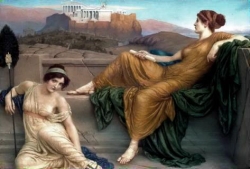
Aedesia was born in Alexandria and lived there for most of her life. She was a part of the Neoplatonic School and was known for her intelligence and beauty. She accompanied her children to Athens where they too were educated in the field of philosophy.
Aedesius - Αἰδέσιος (3rd / 4th century)

Aedesius was born in Cappadocia, but settled in Syria where he apprenticed. As a Neo-Platonist, his concentration was in mysticism. Later in his life, he founded a school of philosophy at Pergamon in Asia Minor, near the Aegean Sea coastline.
Aeneas of Gaza (5th / 6th century)
Aeneas was born in Gaza. He was a Neo-Platonic philosopher and a convert to Christianity. Christianity influenced his work, of which Theophrastus is his most well-known dialogue.
Aenesidemus - Αἰνησίδημος (1st century BC?)

Aenesidemus was born in Knossos, an archaeological site near Heraklion, Crete. He founded the Third Sceptic School also known as Pyrrhonism . Rumoured to have been a member of Plato`s Academy, he became known by breaking from Platonic theories and reviving the principle of epoché (εποχή). The Pyrrhoneia (Πυρρώνειοι λóγοι) is the main work for which he is known and in which are discussed four ideas: the reasons for scepticism and doubt , arguments against causality and truth , a physical theory, and an ethical theory .
Aesara - Αἰσάρα (5th / 4th century BC)
Aesara was a woman philosopher born in the ancient district of Lucania (Λευκανία), in Southern Italy. With little known about her life, Stobaeus preserved a part of her philosophical work entitled On Human Nature. Her learning appears to be of Pythagorean influence.
Aeschines of Neapolis – Αἰσχίνης (2nd / 1st century BC)

Aeschines was born in Neapolis, what is today Naples, Italy. The etymology of the city name Neapolis refers to the founding of a “new town” and this city name is prevalent in many ancient cities of the Hellenistic world. The Academy of Athens at about 110 BC was known to have had three leaders. Aeschines was one of these leaders along with Charmadas and Clitomachus. His learning is a part of Platonism and more precisely that of Academic skepticism .
Aeschines of Sphettus - Αἰσχίνης Σφήττιος (5th / 4th century BC)

Aeschines belonged to the deme (δῆμος) Sphettus, a suburb of Athens, by the birth right of his father Lysanias. In his youth, Lysanias was a follower of Socrates. Aeschines became known as Aeschines Socraticus. After the death of Socrates, Aeschines wrote philosophical dialogues in which Socrates had the main role. Plato also wrote these kind of dialogues. As Dioegenus Laërtius reported, Aeschines wrote seven Socratic dialogues: Alcibiades, Aspasia, Axiochus, Callias, Miltiades, Rhinon, Telauges .
Aetius of Antioch - Ἀέτιος ὁ Ἀντιοχεύς (4th century AD)
Aetius of Antioch was from the Coele (Κοίλη), Syria, which is a Syrian region in classical antiquity. His childhood was marked by poverty or slavery, later becoming a goldsmith in Antioch. He studied philosophy, Christian scriptures, Christian theology, and medicine in Alexandria. Known for debating with other philosophers of Christian Doctrine, he earned the derogatory nickname of “The Atheist”, by the pro-Trinitarian representatives. The Trinitarian representatives learned about God as a Trinity – Father, Son and Holy Spirit. Aetius, however, believed that the idea of the homoousia of trinity is self-contradictory; thus, becoming the leader for the Anomoean sect.
Agapius - Ἀγάπιος (5th / 6th century AD)
Agapius was from Athens where he also was a part of the Neo-Platonist School.
Agathobulus – Agathoboulos (1st / 2nd century AD)
Agathobulus was from Alexandria and known as a Cynic philosopher. Reportedly, Agathobulus taught a training in asceticism
Agathosthenes - Ἀγαθοσθένης
Agathosthenes became known by ancient writers who referred to his work. There are no reliable data on him, other than the fact that he was Greek philosopher, historian and geographer. There is mention of his work “Asiatica Carmina” and his work on the history of the island of Naxos.
Agrippa the Skeptic - Ἀγρίππας (1st / 2nd century AD)
Agrippa was the one of the most famous Skeptic philosophers. The author of Five Grounds of Doubt, “tropes” (τρόποι), he proves with this work the impossibility of true or certain knowledge: dissent, progress ad infinitum, relation, assumption, circularity.
Albinus – Ἀλβῖνος (2nd century AD)
Albinus was from Smyrna, an Ancient Greek city on the Aegean coast of Asia Minor. He was a Platonist and he is known as the author of a short tract called “Introduction to Plato’s Dialogues”. Furthermore , Albinus was quoted by other philosophers who wrote in Latin on music and geometry.
Alcinous – Ἀλκίνους (2nd century AD?)
Alcinous was a Middle Platonist philosopher. Little is known about his life. He is the author of a significant work intended for teachers entitled “ The Handbook of Platonism ( Ἐ πιτομ ὴ τ ῶ ν Πλάτωνος δογμάτων )”, containing 36 chapters dedicated to a variety of subjects ranging from logic and ethics to physics.
Alcmaeon of Croton - Ἀλκμαίων (5th / 5th century BC)
Alcmaeon was born in the ancient city of Crotone in the region of Calabria, Southern Italy, known as Magna Graecia. Being a Pythagorean, he counts among the most significant natural philosophers (φυσικὸν λόγον) and theorists of medicine. His concentration was the philosophy of science, including astrology and meteorology. The thoroughness of his work led him to be the first to identify the Eustachian Tubes.
Alexamenus of Teos - Τήιος Ἀλεξαμενός (5th century BC?)
Alexamenus was from Teos – Τέως, an ancient Greek city in Asia Minor along the coastline of the Aegean Sea. The most significant moment in his life is that he is the first person who wrote Socratic dialogues before the time of Plato.
Alexander of Aegae - Ἀλέξανδρος (1st century AD)
Alexander was from the archaeological site Aegae (Aigai) next to Vergina-Central Macedonia, in northern Greece. He was a Peripatetic philosopher and emperor Nero’s tutor in Rome.
Alexander of Aphrodisias - Ἀλέξανδρος ὁ Ἀφροδισιεύς (2nd / 3rd century AD)
Alexander was from Aphrodisias, a small ancient Greek town within historic Caria, in western Asia Minor. He lived in Athens and was a head of the Peripatetic school. Of all the commentaries on Aristotle’s works, Alexander is known to have written the better ones.
Alexicrates - Ἀλεξικράτης (1st / 2nd century AD)
Alexicrates was a Pythagorean philosopher who lived at the time of Plutarch.
Alexinus – Ἀλεξῖνος (4th / 3rd century BC)
Alexinus was born in Elis-Ἦλις, an ancient Greek district on the Peloponnese peninsula. He later moved to Olympia-Ὀλυμπία, which is in the same region. Though his doctrines were not preserved, he became known for writing against Zeno and Ephorus the historian, and criticizing the rhetorical sophists.
Amelius - Ἀμέλιο (3rd century AD)
Amelius was from Tuscany, Italy. Traveling to Rome he became a Neoplatonic student of the philosopher Plotinus. Later in his life, he settled in Syria. Amelius was not his original name, rather calling himself Amelius in order to emphasize his thoughts on ephemeral things. The word ἀμέλεια (ameleia) means negligence in Greek. He wrote extensively and over 100 volumes of sayings and commentaries have been preserved
Ammonius Hermiae – Ἀμμώνιος ὁ Ἑρμείου (5th / 6th century AD)

Ammonius’ parents were Hermias and Aedesia, Neoplatonist philosophers from Alexandria, who travelled regularly to Athens where they apprenticed and worked; hence, Ammonius lived in Athens and Alexandria. His life work was writing commentaries on Plato, Aristotle and other significant ancient Greek philosophers. The lecture notes kept by his students provide an insight on the extent of his work: On Aristotle’s Categories (anonymous writer), On Aristotle’s Prior Analytics I (anonymous writer), On Aristotle’s Metaphysics 1–7 (written by Asclepius), On Nicomachus’ Introduction to Arithmetic (written by Asclepius), On Aristotle’s Prior Analytics (written by John Philoponus), On Aristotle’s Posterior Analytics (written by John Philoponus), On Aristotle’s On Generation and Corruption (written by John Philoponus), On Aristotle’s On the Soul (written by John Philoponus).
Ammonius of Athens - Ἀμμώνιος (1st century AD)
Ammonius was from Athens, known as Ammonius the Peripatetic. He was a Middle Platonist and Plutarch’s teacher. From Plutarch, we came to know that Ammonius was an expert in the works of Aristotle.
Ammonius Saccas - Ἀμμώνιος Σακκᾶς (2nd / 3rd century AD)
Ammonius was from Alexandria. A Greek Philosopher, he is considered as one of the founders of Neoplatonism. His life work centered on the soul being immaterial. Plotinus, who was his pupil, continued in this theory.
Anaxagoras - Ἀναξαγόρας (5th century BC)

Anaxagoras was born in Clazomenae, an ancient Greek city in Asia Minor on the Aegean coastline. A Pre-Socratic Greek philosopher, he was the first to bring philosophy and the spirit of scientific inquiry from Ionia to Athens. He was a part of the Pluralist School along with Archelaus and Empedocles. Learning at this school was centered with the principle of monism. Anaxagoras, however, believed that the whole of nature contained an innumerable number of principles.
Anaxarchus - Ἀνάξαρχος (4th century BC)
Anaxarchus was born in Abdera, Thrace, an important coastline city. Belonging to the school of Democritus and he promoted the natural philosophy of Atomism. Close friend to Alexander the Great, he followed him into the Asian campaigns. Little is known about his philosophical views. What has prevailed is that his learning was a precursor for Greek Skeptic: a mixture of the atomism of Democritus, and the skepticism of Pyrrho.
Anaxilaus – Anaxilas (1st century BC / 1st century AD)
Anaxilas was from Larissa, the capital city of the Thessaly region of Greece. A Pythagorean philosopher, he also studied the philosophy of nature and psychics. His learning was primarily dedicated to the study of the properties in minerals and herbs.
Anaximander- Ἀναξίμανδρος (7th / 6th century BC)

Anaximander was from Miletus, an ancient Greek city along the coastline of western Asia Minor. A Pre-Socratic Philospher, he belonged to the Milesian School of his native city. His interests were in science and he learned about the universe, the origins and natural law. He spoke of the apeiron (ἄπειρον), which denotes “unlimited,” “infinite” or “indefinite”; thus, constituting an arche (ἀρχή) for him. His life work is characterized by his metaphysical research. Anaximander provided an explanation of how the four elements of ancient physics are formed (air, earth, water and fire). By extension, he further explained how Earth and terrestrial beings are formed through their interactions.
Anaximenes of Miletus - Ἀναξιμένης (6th century BC)

Anaximenes was from Miletus and belonged to the Miletus School. A Pre-Socratic Philosopher and a student of Anaximander, he is known one of the three famous philosophers from Miletus. Concentrating on material monism, Anaximenes spoke about archai (ἀρχαί) as being an aer (air), that substance from which all other things are made of. Pursuing this theory about earth, he concluded that air felted to create the flat disk of the earth resulting with earth behaving like a leaf floating on air.
Androcydes – Androkydes (2nd century BC-?)
Androcydes is well-known because of his work on “On Pythagorean Symbols”. There’s no evidence about his life, other than his being extensively quoted by other philosophers.
Andronicus of Rhodes- Ἀνδρόνικος ο Ρόδιος (1st century BC)
Andronicus was born on Rhodes, the largest island of the Dodecanese Islands of Greece. Little is known about him. He travelled to Rome where he taught and he was a Scholarch, Head of Peripatetic School. His interests lay in the field of the history of philosophy.
Anniceris – Ἀννίκερις (4th / 3rd century BC)
Anniceris lived during the time of Alexander the Great. He belonged to the Philosophy of Cyrenaics or Kyrenaics. This school of philosophy, founded by Aristippus of Cyrene, learned about sensual hedonism. His life work is characterized by denying that pleasure is merely the absence of pain and that reason – λόγος alone can save us from errors.
Antiochus of Ascalon – Άντίοχος ὁ Ἀσκαλώνιος (2nd / 1st century BC)
He was born in Ascalon. His philosophy was a part of Academic School , but at the same time he was influenced by Academic scepticism. Intellectuals feel that with him begins the philosophy of Middle Platonism .
Antipater of Cyrene – Ἀντίπατρος (4th century BC)
Antipater was born in Cyrene in ancient Libya. He lived at the time of the beginig of the Cyreanic School of philosophy.
Antipater of Tarsus - Ἀντίπατρος (2nd century BC)
Antipater was born in Tarsus, the ancient city in Turkey. His philosophical teachings were a part of the Stoic School of Philosophy. He believed in God as a goodwill for all menkind. He wrote two books about this issue. Also, he dealt and with the moral philosophy.
Antipater of Tyre- Ἀντίπατρος ὁ Τύριος (1st century BC)
He was a part of Stoic School of philosophy. He was born in Tyre and died in Athens. His famous works were: " On Duties" and " o n the Cosmos".

Antisthenes - Ἀντισθένης (5th / 4th century BC)
He was born in Athens, but after his childhood he moved to Tanagra. His teacher was Socrates. The most famous source about his philosophy was from papers of Diogenes Laertius. His philosophical work was most in ethics, physics, logic and philosophy of language. Some intellectuals saw him as a founder of Cynics, maybe because his lifestyle was ascetic.
Antoninus - Ἁντωνῖνος (4th century AD)
Antoninus was a Greek philosopher born in Egypt where he founded his own philosophical school. His philosophy was a part of Neoplatonic philosophy. Some of his teachings some of intellectuals titled as paganic teachings.
Apollodorus of Athens – Ἀπολλόδωρος (2nd century BC)
Apollodorus was Athenian philosopher and a son of the famous Ancient Greek historian Asclepiades. He has the most famous teachers of his time such as Diogenes of Babylon. His most famous books are: Chronicle (Χρονικά), On the Gods (Περὶ θεῶν), a twelve-book essay about Homer's Catalogue of Ships, an early etymology with the analyses of the poets Epicharmus of Kos and Sophron, a very few critical and grammatical writings as well as “The encyclopedia of Greek mythology-Bibliotheca”.
Apollodorus of Seleucia - Ἀπολλόδωρος (2nd century BC)
Appollodorus was born in Seleucia, the city in ancient Mesopotamia. He was a part of Stoic philosophy and he was an author of several handbooks in the field of Stoic philosophy, Physics and Ethics. His teacher was Diogenes of Babylon.
Apollodorus the Epicurean – Ἀπολλόδωρος (2nd century BC)
He lived in Athens, where he was the main person of the Epicurean school. He was well-known as a pupil of Zeno of Sidon. He wrote two books: Life of Epicurus and a Collection of Doctrines.
Apollonius Cronus - Κρόνος Ἀπολλώνιος (4th century BC)
Apollonuius was born in Cyrene, the city in ancient Libya. His philosophy was a part of the Megarian school. There`s no eveidence about his life exept the fact that his pupils was Diodorus Cronus and Strabo as well as he was a pupil of Eubulides.

Apollonius of Tyana – Ἀπολλώνιος ὁ Τυανεύς (1st century AD)
Apollonius was born in Tyana, the city of ancient Anatolia. This philosopher was very interesting because he lived in the thime of Jesus of Nazareth by opinion of many schoolars and he was some kind of “Jesus of philosophy of that time”. Thanks to Julia Domna, the wife of Roman Emperor Lucius Septimius Severus, which took the request to the philosopher Philostratus to write biography about Apollonius we today know some facts about his life. Some of these facts are that Apollonius had extra-sensory perception. He was inspiration for schoolars over years as well as for writers and novelists around the world.
Apollonius of Tyre – Ἀπολλώνιος (1st century BC)
Apollonius was born in Tyre, the city of ancient Lebanon. By some authors such as Strabo or Diogenes Laertius he was a part of Stoic philosophy, with the high influence of the teachings of Zeno.

Arcesilaus - Ἀρκεσίλαος (4th / 3rd century BC)
Arcesilaus was born in Pitane, the ancient Greek Asia Minor. He is well known as a founder of the phase of the Academic Scepticism of Athenian Academy. He was a pupil of mathematician Autolycus as well as his teacher was and philosopher Theophrastus in the period of his life in Athens where he studied rethoric and philosophy. He hadn`t writings works. What is known is that he writes about teachings of Plato and Cicero. His main oponents were the Stoics philosophers.
Archedemus of Tarsus – Άρχέδημος (2nd century BC)
Archedemus was born in Tarsus in ancient Turkey. Today we know about his work thanks to some of authors of the ancient time such as Diogen Laertie, Ciciero, Seneca or Epictetus. By this authors Archedemus was a part of the philosophy of Stoia. His main writings in the field of philosophy are: Περὶ Φωνῆς- On the Voice and Περὶ Στοιχείων-On Elements.
Archelaus – Ἀρχέλαος (5th century BC)
Archelaus was born in Miletus, but his family was from Athens. By the opinion of schoolars he`s well known because he was the teacher of Socrates. His philosophy was a part of Physicus or Ionnian Scool of Philosophy. The teachings of that school were in the field of natural philosophy and he was the first teacher of this discipline in Athens. His teacher was Anaxagoras. There`s no writings of him but there`s well known teachings of him about the the Sun as the largest star in the cosmos. This kind of philosophy is high influenced by his main teacher Anaxagoras.
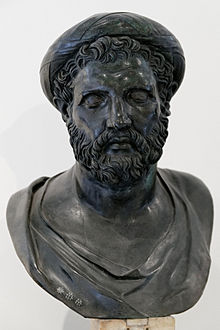
Archytas - Ἀρχύτας (5th / 4th century BC)
He was from Tarentum, the city of ancient Magna Grecia. Behind philosophy he dealt and with mathematics, astronomy, strategy, etc. He was well-known as a first mathematician who dealt with the mathematical mechanics. His most famous work was so-called “The Archytas curve” . As a philosopher, many of schoolars notice that he was probably rolle-model for a Plato`s learning about king who is philosopher at the same time (the rolle-model of sophocracy ).

Arete of Cyrene – Ἀρήτη (4th century BC)
Arete of Cyrene was a woman philosopher. She was born in Cyrene, the city in ancient Libya. Her father and the teacher at the same time was Aristippus, pupil of Socrates. She was also teacher to her own son as Greeks say μητροδίδακτος. She dealt with the moral and natural philosophy in Attica for a years. She was not only clever, but she was very beautiful woman as historian described her she was “the beauty of Helens” .

Arignote - Ἀριγνώτη (6th / 5th century BC)
Arignote was born in Croton, the city in ancient Calabria. She was a woman philosopher and a part of the Pythagorean philosophy. She was a pupil of Pythagoras. There are several writings of she such as: Bacchica (Βακχικά, Bakkhika, "Of Bacchus"), The Mysteries of Demetra (Περὶ τῶν Δήμητρος Μυστηρίων, Peri ton Demetros Mysterion), A Sacred Discourse (Ἱερὸς Λόγος, Hieros Logos), Mysteries of Dionysus (Τελεταὶ Διονύσου, Teletai Dionysou).

Aristarchus of Samos- Ἀρίσταρχος ὁ Σάμιος (c. 310 – c. 230 BC)
He wasn`t only a philosopher but a well-known astronomer and mathematician of the Ancient Greek world. His native place was an island Samos in the eastern Aegean Sea in Greece. His teachings were the most about heliocentrism. His inspiration was Philolaus of Croton , but his ideas were usually suspicious by Aristotle for example. Today, his statue stands at the Aristotle University of Thessaloniki .
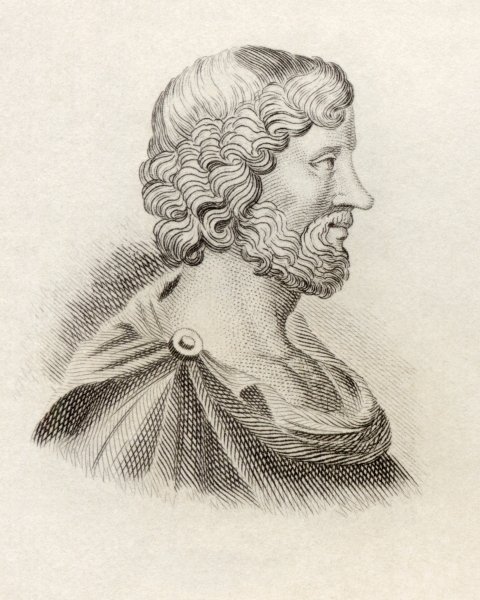
Aristippus - Ἀρίστιππος (c. 435 – c. 356 BCE)
He was bor in Ancient Lybia, precisely in Cyrene. He was well-known as a founder of the famous Cyreanic school. His teacher was Socrates . Very interesting detail from his personal life was that his daughter was beautiful woman philosopher Arete. He was an author of the controversial book about the private life of intellectuals of his time entitled " On the Luxury of the Ancients".
Aristippus the Younger- Ἀρίστιππος (4th century BC)
He was famous mostly as a grandson of Aeistippus and a son of Arete of Cyrene. His nickname was "Mother-taught" - metrodidaktos because he was a pupil of his mother also well-known philosopher. His philosophy was a part of the Cyreanic School .
Aristoclea - Θεμιστόκλεια (fl. 6th century BC)
She was a woman philosoher. Her name was also Themistoclea. At the same time she was a priestess in ancient oracle of Delphi.
Aristocles of Messene- Ἀριστοκλῆς ὁ Μεσσήνιος (1st century AD?)
He was born in ancient Sicily. His pupil was Alexander of Aphrodisias. He wrote a few works such as: Πότερον σπουδαιότερος Ὅμηρος ἢ Πλάτων - Whether Homer or Plato is more Worthy, Τέχναι ῥητορικαί - Arts of Rhetoric, A work on the god Serapis, Ethics (nine books), Philosophy (in ten books) .
Aristocreon-Ἀριστοκρέων (fl. 200 BC)
He was born and lived in Athens. His philosophy was a part of the Stoic School . An interesting detail of his life is that he was a cousin of Chrysippus who was at the same time and his teacher.
Aristo of Alexandria - Ἀρίστων (2nd /1st century BC)
He was born in Alexandria in ancient Egypt. His philosophy was influenced by Strabo and also it was a part of the Peripatetic School.
Aristo of Ceos - Ἀρίστων ὁ Κεῖος (3rd / 2nd century BC)
He was born in the Island of Ceos. He was a part of the Peripatetic School and also was a head of the school about 269 BC. There`re doubts about the authenticity of his written works.
Aristo of Chios - Ἀρίστων ὁ Χῖος (fl. c. 260 BC)
He was well-known Stoic philosopher. His philosophy was a backbone of the system of Stoic philosophy but it was very close to Cynic philosophy. Aristo was born in Chios but lived in Athens. He didn`t accept learnings of Zeno about the logic and physic even he was his pupil. His the main moments in philosophy are: logic, physic and ethics.

Aristotle of Cyrene - Ἀριστοτέλης ( fl. 325 BC)
He was born in Cyrene and he was a part of famous the Cyreanic School. There`re no detailed evidence about his work and life.
Aristotle of Mytilene - Ἀριστοτέλης ὁ Μυτιληναῖος (2nd century AD)
He was a part of the Perpatetic School . He was born in Mytilene and his well-known pupil was Alexander of Aphrodisias.
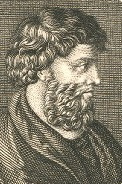
Aristoxenus - Ἀριστόξενος ὁ Ταραντίνος (b. c. 375, fl. 335 BCE)
He was born in ancient Taranto in Southern Italy . He was a part of the Peripatetic School. His teacher was famous Aristotle. His interest in philosopy was mostly in ethics, but also and in music. His well-known works are: " Elements of Harmony ( Ἁρμονικῶν στοιχείων)" and " On the Primary Duration ( chronos )".
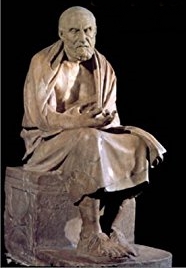
Arius Didymus - Ἄρειος Δίδυμος (1st century BC)
He lived in ancient Alexandria in Egypt . He is well-known as a part of the Stoic School . An interesting detail from his life was that he wanted the death of the son of Cleopatra and Caesar because the world needed just one Caesar .
Asclepiades of Phlius - Ἀσκληπιάδης (c. 350 – c. 270 BC)
He was born in ancient Phlius , today`s area of Corinthia . He was an eretrian philosopher . His life he spent in Megara. There`re controversial details about his private life.
Asclepiades the Cynic - Ἀσκληπιάδης (4th century AD)
He was a part of the Cynic School . There`s a story about his destruction of the temple of Apollo at Daphne in Antioch.
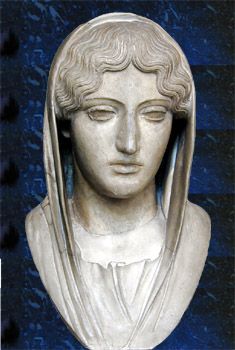
Asclepigenia - Ἀσκληπιγένεια (5th / 6th century AD)
She was a woman philosopher born in Athens , where she lived. At the same time she was and mystic. Her whole family was in philosophy. She was a daughter of Plutarch of Athens . She believed that in there being five realms of reality: the One, Nature, Matter, Soul, and Intelligence. Also she studied the philosophy of Aristotle and Plato, as well as the philosophy of her father.
Asclepiodotus - Ἀσκληπιόδοτο (1st century BC)
He was well-known and as Asclepiodotus Tacticus. He was a philosopher and at the same time a writer. His the most famous work is Quaestionum Naturalium Causae.
Asclepiodotus of Alexandria - Άσκληπιόδοτος (5th century AD)
He was born in ancient Alexandria in Egypt but he studied in Athens and was a part of the neoplatonic philosophy .
Aspasius - Ἀσπάσιος (2nd century AD)
He was a part of the Peripatetic School. His philosophy is mainly based on writing works of Aristotle.
Athenaeus of Seleucia ( 1st century BC)
He was born in Seleucia , in ancient Mesopotamia . By scholars he is well-known because of his work " On Machines (Περὶ μηχανημάτων)". He was a part of the Peripatetic School .
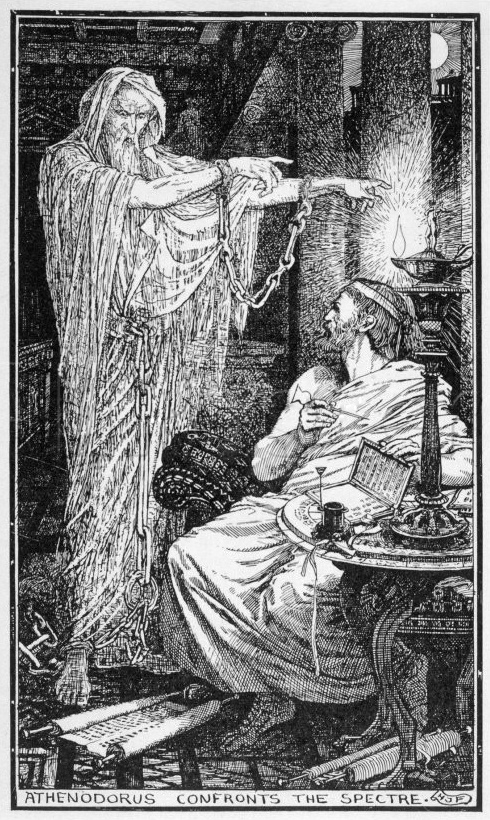
Athenodoros Cananites - Ἀθηνόδωρος Κανανίτης (1st century BC)
His native place was Canana . He was a part of the Stoic School . His well-known works are: A work against the Categories of Aristotle, A history of Tarsus, A work dedicated to Octavia Minor, "On zeal and youth (περὶ σπουδῆς και παιδείας)", "Discourses (περίπατοι)".
Athenodoros Cordylion - Αθηνόδωρος Κορδυλίων ( fl. early-mid 1st century BC)
His native place was in Tarsus. He was a member of the Stoic School and he worked as a caretaker of the famous library of Pergamon . At the old age he lived in Rome until the end of his life.
Athenodorus of Soli - Ἀθηνόδωρος ὁ Σολεύς (3rd century BC)
He was well-known as a philosopher of the Stoic School . He was born in Soli, in ancient Cilicia .
Attalus - Ἄτταλος (1st century BC / 1st century AD)
He was a part of the Stoic School . He worked and lived at the time of emperor Tiberius . His the most popular pupil was Seneca .
Atticus - Ἀττικός (2nd century AD)
He was a Middle- Platonist . His philosophy has very polemic style which describes Aristotle as an atheist. He lived and work at the time of Marcus Aurelius.
Basilides (Stoic) - Βασιλείδης (2nd century BC)
There`s no evidence about the details of his personal nor philosophical life. The fact is that he was a part of the Stoic School.
Basilides the Epicurean - Βασιλείδης (c. 250-c. 175 B)
There`s evidence that he was a part of the Epicurean School of philosophy. He lived in Athens .
Batis of Lampsacus (3rd century BC)
He was born in Lampsacus . This ancient city is based in northern Troad. His teacher was famous Epicurus . He was an Epicurean philosopher .
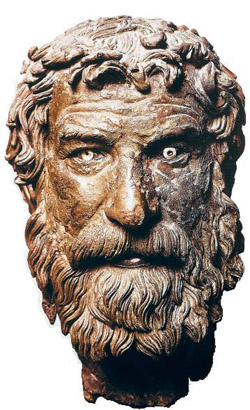
Bion of Borysthenes - Βίων Βορυσθενίτης (4th / 3rd century BC)
At the first time he was a slave but after that he studied philosophy in Athens . He was a part of the Cyinic School of philosophy. He was born in Olbia in Ukraine . His the most popular work is " Diatribes" which has a satirical style against the behavior of people.
Boethus of Sidon - Βόηθος (c. 75 – c. 10 BC)
He was born in Sidon , in ancient Lebanon . His life he spent and in Rome and Athens . He was a part of the Peripatetic School . His works have been lost but there`s evidence that he wrote about Aristotle`s Categories .
Boethus of Sidon (Stoic) - Βοηθός (c. 75 – c. 10 BC)
Like his namesake and contemporary, he was born in ancient Lebanon but his philosophy was a part of the Stoic School. His teacher was Diogenes of Babylon . His well-known works are: " On Nature" and "On Fate".
Bolus of Mendes - Βῶλος (fl. 3rd century BC)
He lived Egypt during the Ptolemaic dynasty . He was a part of neo-Pytagoreian School of Philosophy . Among philosophy he dealt and with esoterica and medicine . He was a pupil of famous Democritus .
Brontinus - Βροντῖνος (fl. 6th century BCE)
He was born in Matapontum in ancient Magna Grecia . He was a part of the Pythagorean School of philosophy. His teacher was Pythagora . In addition to philosophy, he also wrote poems.
Bryson of Achaea - Βρύσων (fl. 330 BCE)
There`s no evidence about his personal and professional life. It`s known that he was a part of the Megarian School and that he lived in the time of famous Socrates .
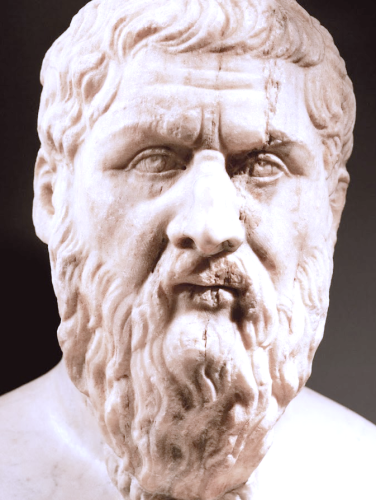
Callicles - Καλλικλῆς (c. 484 – late 5th century BCE)
He was born and lived in Athens . He was a famous political philosopher of his time. He was also well-known because Plato mentioned him in his work "Gorgias". He was a part of the Sophistic School of philosophy . His teacher was Gorgias .
Calliphon - Καλλιφῶν (2nd century BC)
Details about him are known thanks to Cicero . There`s no evidence about his personal life. He was a Peripatetic philosoper.
Calliphon of Croton (6th century BC)
He was born in ancient Croton in Italy . He was a philosopher, physician and priest. As a colleague of Pythagoras h e was a follower of his philosophy.
Callistratus - Καλλίστρατος (the 3rd (or possibly 4th) century AD)
He was a part of the Sophistic School. His well-known work is " Ekphraseis".
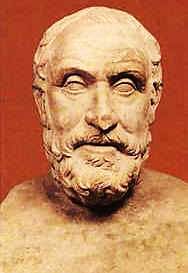
Carneades - Καρνεάδης (c. 214 BC – 129/8 BC)
His native place was Cyrene . He was the head of the Academy . His philosophy was an academic skepticism.
Carneiscus ( c. 300 BC)
He was a part of the Epicurean School of philosophy. His teacher was Epicurus . His most important work is " Philistas" whisch was founded at Herculaneum.
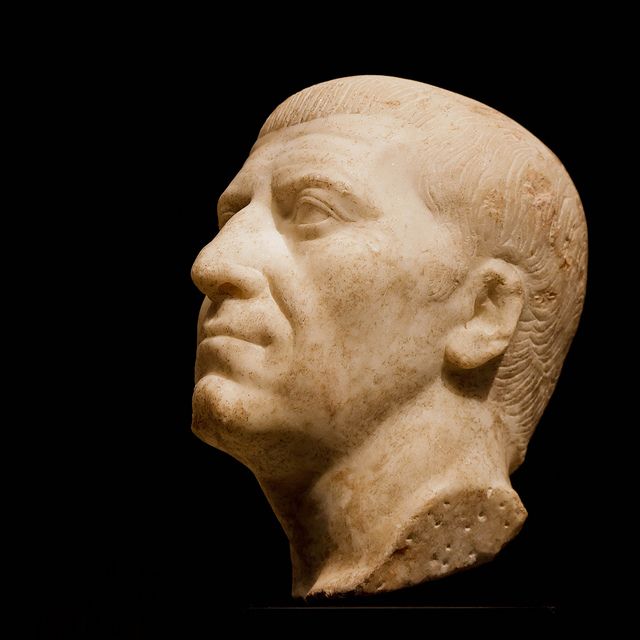
Cassius Longinus - Κάσσιος Λογγῖνος (c. 213 – 273 AD)
He was born in Emesa , in ancient Syria. He was educated in Athens . At the same time he was rheorician and philosopher . His well-known works were: " Homeric Questions" , " Homeric Problems and Solutions" , " Whether Homer is a Philosopher" and many others.
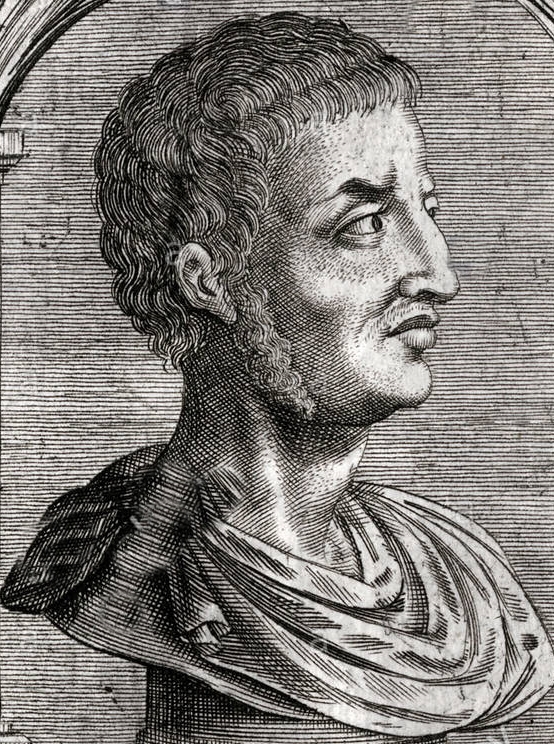
Cebes - Κέβης ( c . 430 – 350 BCE)
He was born in ancient Thebes in central Greece . His teacher was Socrates. There`s uncertainty over the authenticity of the work " Pinax (Πίναξ)" attributed to him.
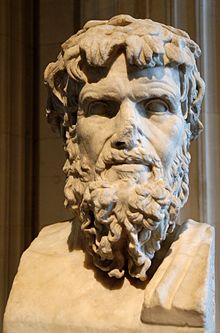
Celsus - Κέλσος (2nd-century)
He is known as a philosopher who has dedicated his work " Discourse (Λόγος Ἀληθής) against Christianity .
Cercidas - Κερκιδᾶς (3rd century BCE)
He was born in ancient Megalopolis. He was a part of the Cynic School of philosophy. At the same time he was a poet and legislator.
Cercops - Κέρκωψ (-)
He was a Pythagorean philosopher and a poet of ancient times. There`s no reliable evidence about his life and work.
Chaerephon - Χαιρεφῶν (c. 470/460 – 403/399 BCE)
He was born in Athens. He was a Socratic philosopher and also the great friend of Socrates. He is mentioned in many ancient works such as Aristophanes` comic plays " The Clouds" , " The Wasps" , " The Birds" or Xenophons` " Memorabilia" and Platos` "Apology".
Chamaeleon - Χαμαιλέων ( c. 350 – c. 275 BC)
He was born in ancient Asia Minor. He was a part of the Peripatetic School of philosophy. His teacher was famous Aristotle. He is the author of numerous ancient Greek poems.
Charmadas - Χαρμάδας (164 BC - c. 95 BC)
He was well-known Academic skeptic. His teacher was Carneades. After a period spent in the Academy, he led in the Ptolemaion, his own Ancient Athenian gymnasium.
Chrysanthius - Χρυσάνθιος (fl. 4th century)
He was a part of the Neoplatonic School of philosophy. He was a pupil of famous philosophers such as Iamblichus and Aedesius.

Chrysippus - Χρύσιππος ὁ Σολεύς ( c. 279 – c. 206 BC)
He was born in ancient Cilicia. His life he spent in Athens. His teacher was famous stoic philosopher Cleanthes. After his teacher`s death he became the head of the Athenian Stoic School. His philosophy is well-known thanks to his ethics, logic, physics and theory of knowledge.
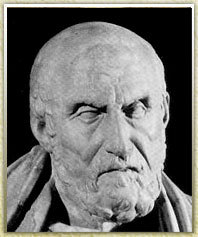
Cleanthes - Κλεάνθης (c. 330 BC – c. 230 BC)
His native place was ancient Assos in Turkey. He was a part of the Stoic School of philosophy. His life he spent in Athens. His teacher was famous Zeno and his pupil was Chrysippus . After his teacher he became the head of the Stoic School. His philosophy is well-known thanks to his physics, pantheism and materialism . His most famous work is a Hymn to Zeus.
Clearchus of Soli - Kλέαρχoς ὁ Σολεύς (4th–3rd century BCE)
His native place was ancient city Soli in Cyprus . He was a Peripatetic philosopher. He has written many works of which the most famous is the book "Of Education (Περὶ παιδείας)".
Cleinias of Tarentum - Κλεινίας (fl. 4th-century BCE)
He was born in ancient Tarentum in Southern Italy. He was a part of the Pythagorean School of philosophy. His best friend was Plato. His the most famous text is "Clinias".
Cleomedes - Κλεoμήδης (-)
There`s no evidence about his life and death. He is known as a Stoic philosopher and astronomer. His the most important work is "On the Circular Motions of the Celestial Bodies" .
Cleomenes - Κλεομένης (fl. c. 300 BCE)
He was a part of the Cyinic School of philosophy. His teacher was Crates of Thebes. His most important work is " Pedagogues ( Παιδαγωγικός )".
Clinomachus - Κλεινόμαχος (4th-century BCE)
He was born in ancient Turii in Magna Graecia. He was a part of the Megarian School of philosophy. His philosophy is well-known thanks to his dialectics.
Clitomachus - Κλειτόμαχος (187/6–110/9 BC)
He was born in ancient Carthage in Tunisia, but he spent his life mostly in Athens where he was a head of the Academy. He was a pupil of Carneades . He was an Academic skeptic . One of his most important work is " On the Withholding of Assent".
Colotes - Κολώτης Λαμψακηνός (c. 320 - after 268 BC)
His native place was ancient Lampsacus in the northern Troad. His teacher was Epicurus and he was a part of the Epicurean School of philosophy. His works have dealt with the criticism of the famous philosophers such as Socrates for example.
Crantor - Κράντωρ (born c. 350 BC - died 276/5 BC)
His native place was ancient Soli in Cilicia. His life he spent in Athens. His teacher was Xenocrates . He was an Academic Platonist. One of his the most important works is "On Grief (Περὶ Πένθους)".
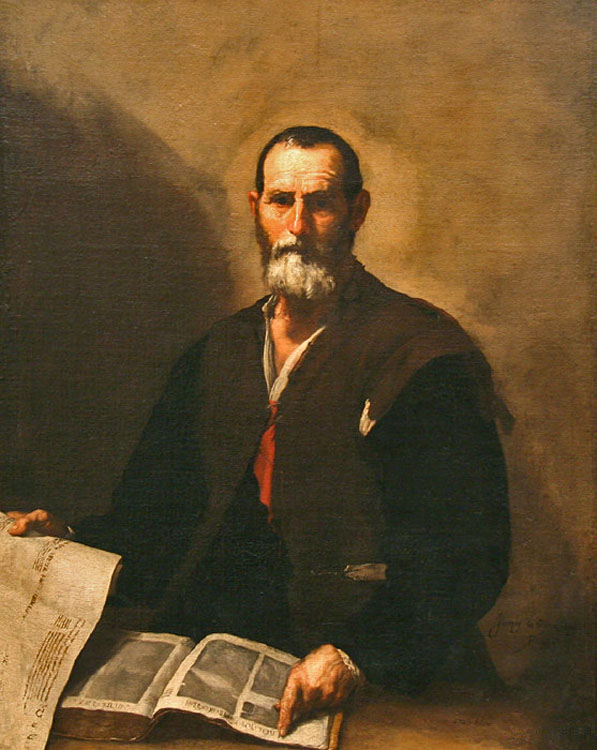
Crates of Athens - Κράτης ὁ Ἀθηναῖος (died 268-265 BC)
He was born in Athens . His teacher was Polemo and he was an Academic Platonist .
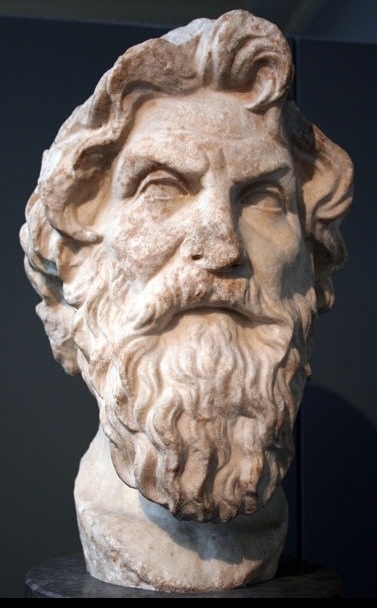
Crates of Mallus - Κράτης ὁ Μαλλώτης ( fl. 2nd century bc)
He was born in ancient Mallus in Cilicia . He was a part of the Stoic School of philosophy. As a grammarian and philosopher he worked as the leader of the famous Library of Pergamum. He`s well-known because of his so-called " The Globe of Crates".
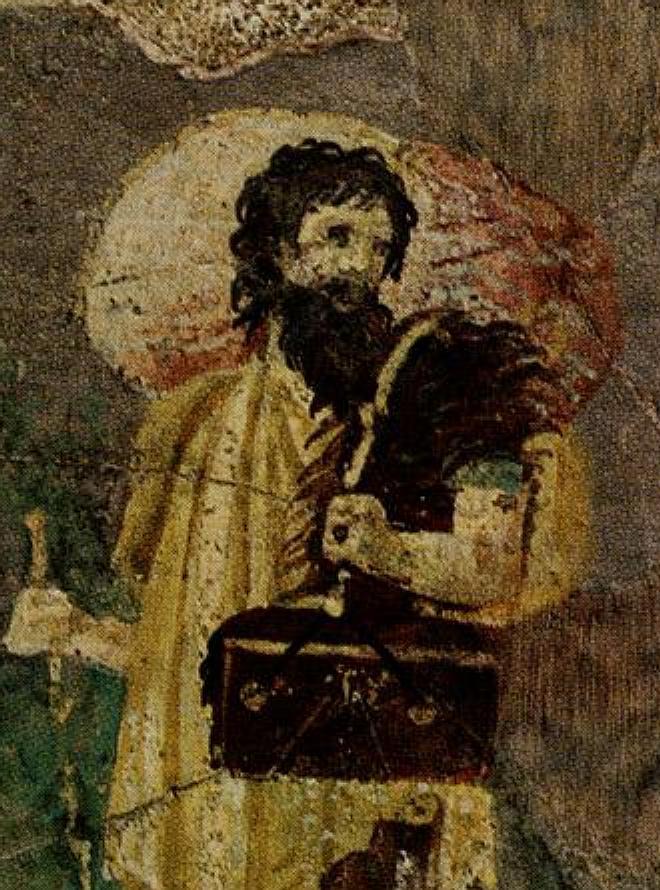
Crates of Thebes - Κράτης ὁ Θηβαῖος (c. 365 – c. 285 BC)
Crates was born in ancient Thebes, in Central Greece. He was a part of the Cynic School of philosophy. He was well-known as a teacher of the founder of Stoicism, Zeno of Citium. He wrote poems and humorous . One of his the most important works is " Games ( Παίγνια)".
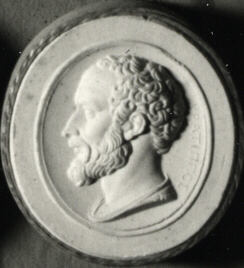
Cratippus of Pergamon - Κράτιππος (1st century BC)
His native place was ancient Pergamon in Asia Minor. He was the most famous philosopher of the Peripatetic School. He lived in Myltene and Athens .
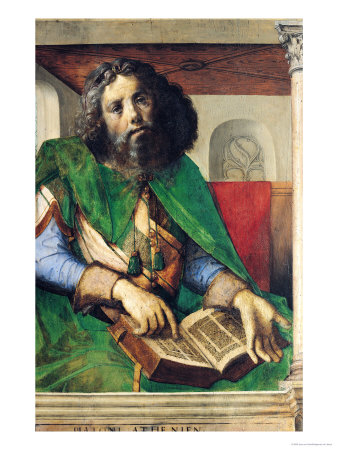
Cratylus - Κρατύλος ( the mid-late 5th century BCE)
This philosopher is well-known thanks to Plato`s dialogue entitled with his name. Philosophy based on his teachings is called Cratylism.
Crescens the Cynic (2nd century)
This philosopher was a part of the Cynic School of philosophy. His philosophy is based on a critique of Christianity.
Crinis - Κρὶνις (2nd century BC)
He was a part of the Stoic School of philosophy. His the most important work was in the field of logic entitled " Dialectic Art (διαλεκτικὴ τέχνε)".
Critolaus - Κριτόλαος (c. 200-c. 118 BC)
His native place was in ancient Phaselis , in Lycia. He was a Peripatetic philosopher. His life he spent in Rome. His philosophy was based on rhetoric and ethics.
Cronius - Κρόνιος (2nd century)
He was well-known and as Cronius the Pythagorean. He was a part of the Neopythagorean School of phylosophy.
Damascius - Δαμάσκιος (born c. 458, died after 538)
He was born in ancient Damascius in Syria. He was a Neoplatonic philosopher . In the history of philosophy he is well-known as the last philosopher of the School of Athens . His works are dedicated to famous philosophers Plato and Aristotle .
Damis (the early 1st up to the early 2nd century AD)
He was a well-known Neopythagorean. He was a pupil of Apollonius .

Damo - Δαμώ ( fl. c. 500 BC)
Damo was a woman philosopher born in ancient Croton , in Magna Graecia . She was a part of the Neopythagorean School of philosophy. She was a daughter of famous Pythagoras . She had the conviction that poverty and the writings of his father were more precious than gold. This is testified thanks to Diogenes Laertius .
Dardanus of Athens - Δάρδανος ( c. 160-c. 85 BC)
He was born in Athens. He was the head of the Stoic School of philosophy. His teachers were Diogenes and Antipater.
Demetrius Lacon (late 2nd century BC)
He was a part of the Epicurean School of philosophy. He was born in Laconia. His teacher was Protarchus. He wrote many papers.
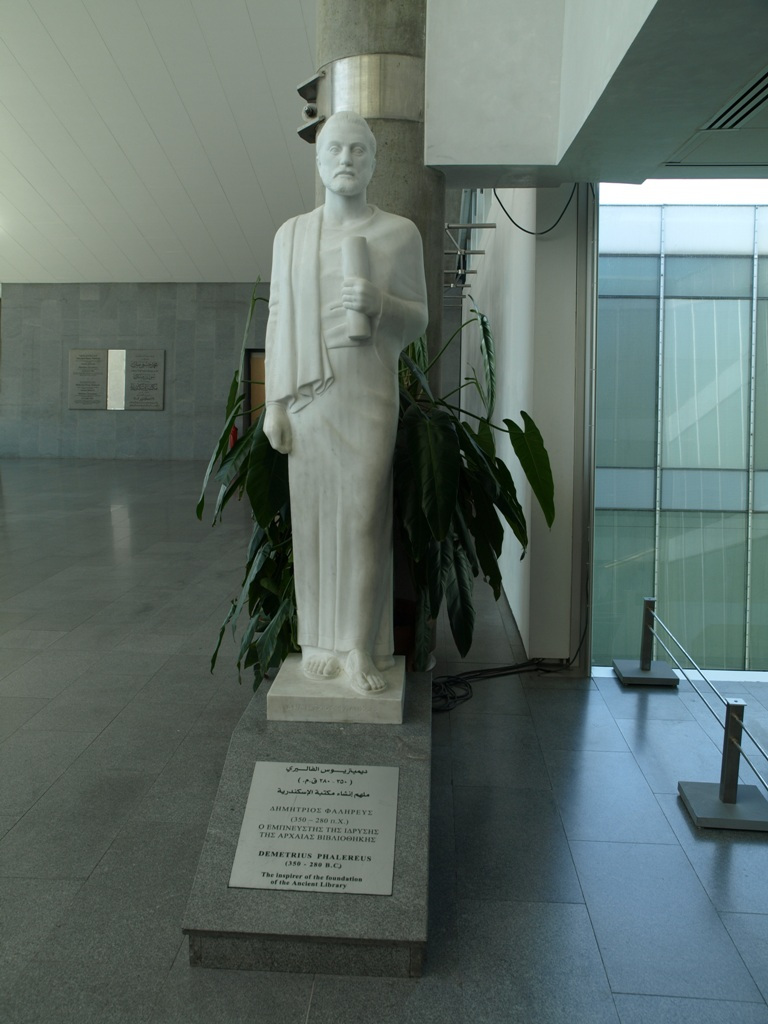
Demetrius Phalereus - Δημήτριος Φαληρεύς (c. 350 – c. 280 BC)
He was born in ancient Phalerum, in Athens. He was a part of the Peripatetic School of philosophy. His teacher was Theophrastus. He worked and in Thebes and Alexandria. His philosophy is well-known thanks to his literary criticism, rhetoric and history.
Demetrius of Amphipolis - Δημήτριος ὁ Ἀμφιπολίτης (fl. 4th century BC)
There`s no evidence about his life but the fact is that he was an Academic Platonist. His teacher was Plato.
Demetrius the Cynic - Δημήτριος (fl. 1st century)
His native place was ancient Corinth but he lived and in Rome . He was a part of the Cynic School of philosophy.

Democrates - Δημοκράτης (-)
There`s no evidence about his life but the fact is that he was a part of the Pythagorean School of philosophy. His the most important work is " G olden Sentences (γνῶμαι χρυσαῖ)".
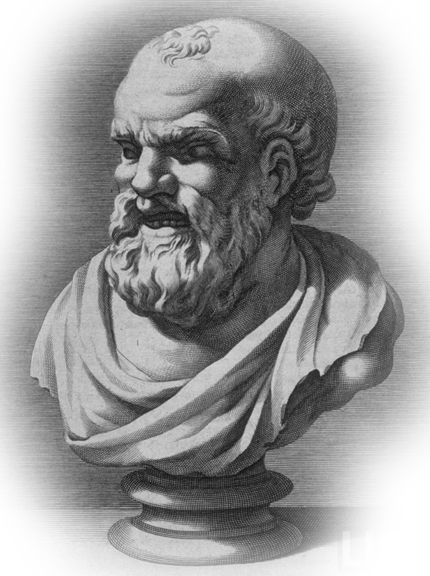
Democritus - Δημόκριτος (c. 460 – c. 370 BC)
Democritus is one of the most important ancient Greek philosophers . His native place was ancient Abdera. He was a part of the Presocratic School of philosophy, but at the same time he was an A tomist. He was a pupil of Leucippus. His philosophy is well-known thanks to his aesthetics, epistemology, politics, mathematics, cosmology, biology, etc. Although he has not reached the glory of Aristotle , many scientists have called him the "father of modern science".
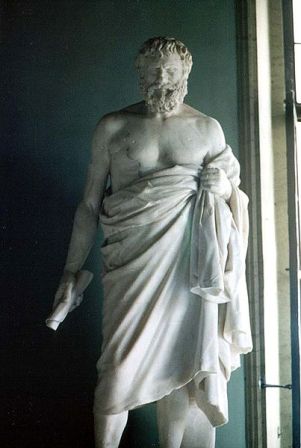
Demonax - Δημώναξ (c. AD 70 – c. 170)
He was a part of the Cynic School of philosophy. He was born in Cyprus. He was also well-known as a teacher of Lucian who wrote the book about his life entitled "Life of Demonax".
Dexippus - Δέξιππος (fl. 350)
He was a part of
the Neoplatonic School
of philosophy. His teacher was
Iamblichus.
As a matter of fact his philosophy is a critique of
Aristotle`s
and
Plato's
philosophy.
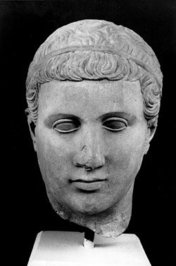
Diagoras of Melos - Διαγόρας ὁ Μήλιος (the 5th century BC)
His native place was ancient Melos . He was well-known as an atheist . His philosophy was a critique of Greek religion.
Dicaearchus - Δικαίαρχος (c. 350 – c. 285 BC)
His native place was Messina in Sicily . He was a Peripatetic philosopher and a pupil of famous Aristotle . He studied philosophy at the Lyceum . At the same time he was an historian , but he wrote and books about politics and philosophy . His the most important writing is " Life of Greece".
Dio Chrysostom - Δίων Χρυσόστομος (c. 40 CE – c. 115 CE)
His native place was ancient Bursa . He was a Sophist but at the same time he was and an orator and historian . His the most important work is " Discourses (Λόγοι)".
Diocles of Cnidus - Διοκλῆς (fl. 3rd or 2nd century BC?)
He was an Academic Platonist. His the most important work is " Διατριβαί ( Discussions )".
Diodorus Cronus - Διόδωρος Κρόνος (died c. 284 BCE)
He was a part of the Megarian School of philosophy. His native place was ancient Iasus .
Diodorus of Adramyttium - Διόδωρος (fl. 1st century BC)
He was an Academic skeptic . His native place was ancient Adramyttium. At the same time he was and a rhetorician .
Diodorus of Aspendus ( the 4th century BC - - )
He was a part of the Pythagorean School of philosophy. He was born ancient Aspendus .
Diodorus of Tyre - Διόδωρος (- -)
He was a part of the Peripatetic School of philosophy. His teacher was Crytolaus. His native place was ancient Tyre in Lebanon .
Diodotus - Διόδοτος ( fl. 1st century BC)
He was a part of the Stoic School of philosophy. He was a contemporary of Cicero .
Diogenes of Apollonia - Διογένης ὁ Ἀπολλωνιάτης (fl. 425 BC)
He was born in ancient Apollonia. His life he spent in Athens. He was a Presocratic philosopher. His the most important work was " On Nature (Περὶ Φύσεως)".
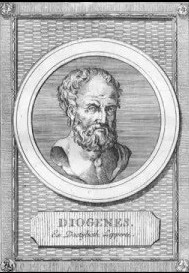
Diogenes of Babylon - Διογένης Βαβυλώνιος (c. 230 – c. 150/140 BC)
His native place was ancient Seleucia . He was the head of the Athenian Stoic School of philosophy. On the most important his works is "Διαλεκτικὴ τέχνη ( Dialectic Art)" .
Diogenes of Oenoanda - Διογένης ὁ Οἰνοανδεύς (the 2nd century AD)
His native place was ancient Oenoanda. He was a part of t he Epicurean School of philosophy. His philosophy was well-known thanks to his ethics, epistemology and physics .
Diogenes of Seleucia - Διογένης ( fl. 2nd century BC)
He was born in ancient Seleucia. He was a part of the Epicurean School of philosophy.
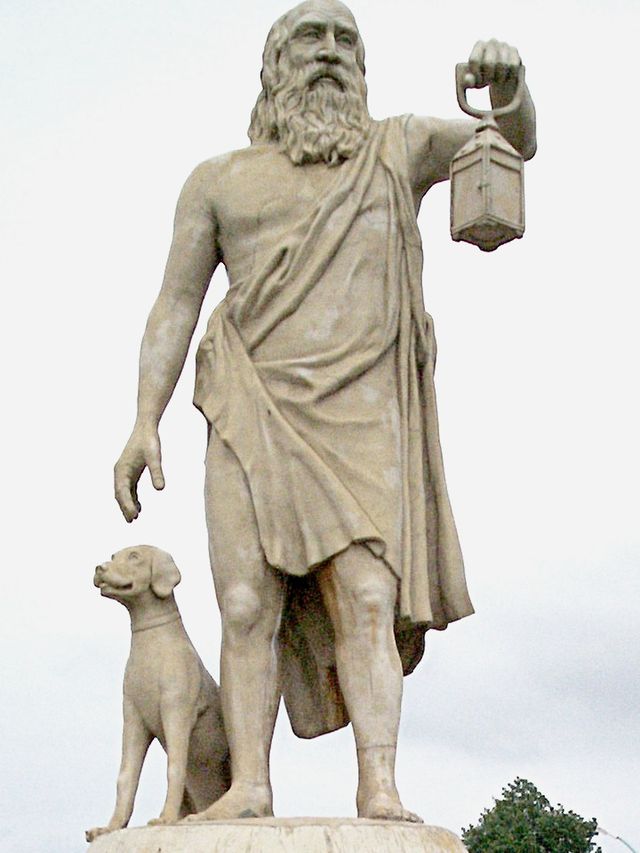
Diogenes of Sinope - Διογένης ὁ Κυνικός (412 or 404 BC - 323 BC)
He was one of the most famous ancient Greek philosophers. His native place was ancient Sinope in Turkey. He is also well-known as one of the heads of the Cynic School of philosophy. There`re many popular stories about his life and work.
Diogenes of Tarsus - Διογένης ὁ Ταρσεύς (fl. 2nd century BC)
He was born in ancient Tarsus . He was a part of the Epicurean School of philosophy. One of his the most important works is " Epitome of Epicurus’ ethical doctrines ( ἐπιτομὴ τῶν Ἐρικούρου ἠθικῶν ζητημάτων)".
Dionysius of Chalcedon (fl. 320 BC)
He was born in ancient Chalcedon in Asia Minor . He was a Megarian philosopher .
Dionysius of Cyrene ( c. 150 BC)
He was born in ancient Cyrene . He was a part of the Stoic School of philosophy. One of his teachers was Antipater of Tarsus . At the same time he was a mathematician.
Dionysius of Lamptrai (3rd century BC)
He was the head of the Athenian Epicurean School of philosophy.
Dionysius the Renegade - Διονύσιος ὁ Μεταθέμενος (c. 330 – c. 250)
His native place was ancient Heraclea . He was a part of the Stoic School of philosophy. His teacher was Zeno of Citium. One of his the most important works is "Περὶ ἀπαθείας - On Apathy".
Dio of Alexandria - Δίων (the first century BC)
He was born in ancient Alexandria in Egypt . He also lived in Rome. He was an Academic skeptic.
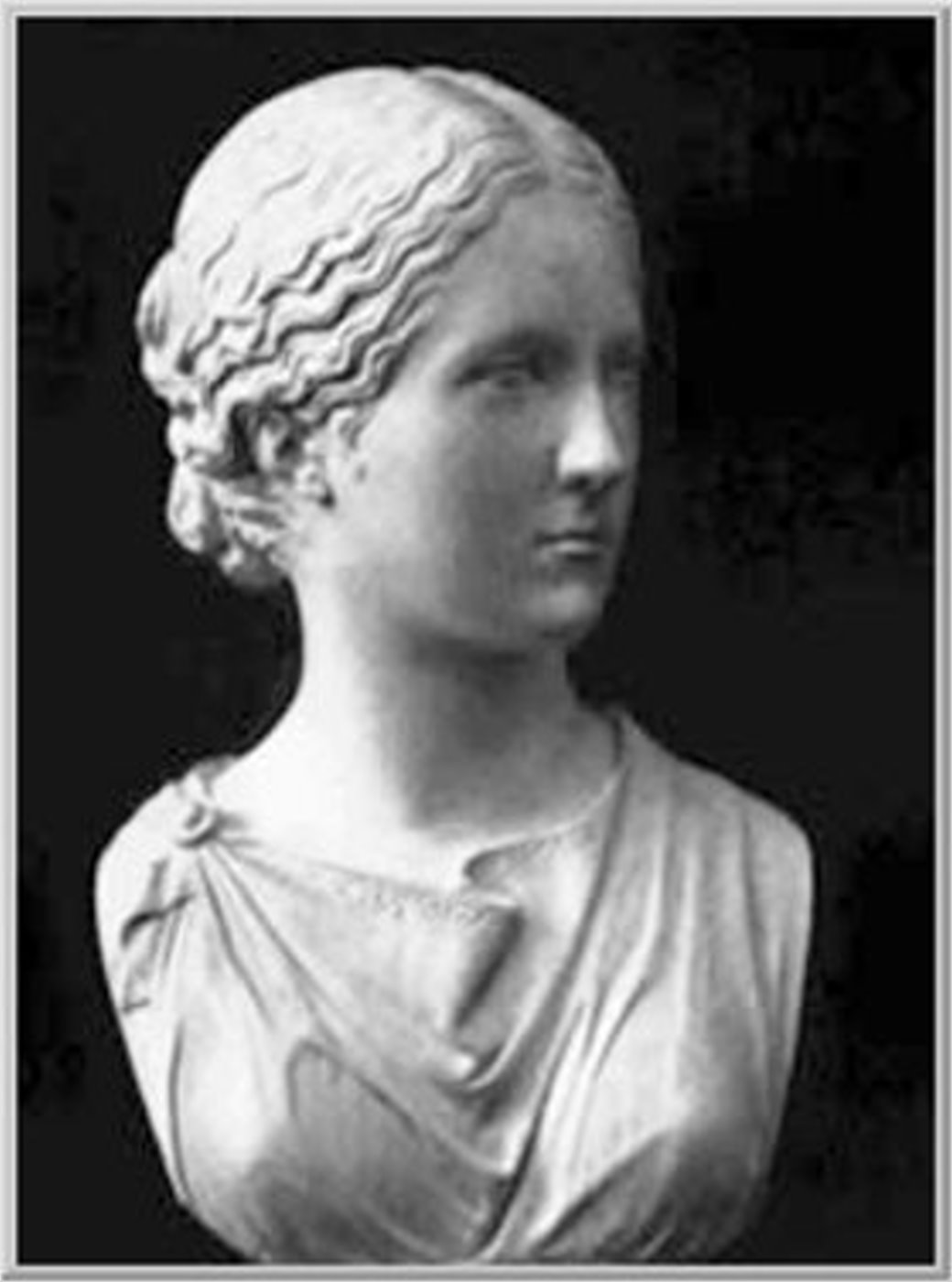
Diotima of Mantinea - Διοτίμα (--)
She was a woman philosopher and at the same time a priestess. Her native place was ancient Mantinea . Her philosophy is well-known thanks to her teachings about the philosophy of Platonic love . She was very important person in Plato`s Symposium .
Diotimus - Διότιμος (c. 100 BC)
He was a part of the Stoic School of philosophy. It`s known fact that he was accused Epicurus that he was the plagiarist. Also he never have the glory of Epicurus .
Domninus of Larissa - Δομνῖνος (c. 420 - c. 480)
He was a Neoplatonic philospher born in ancient Larissa. One of his the most important works is " Manual of Introductory Arithmetic (Ἐγχειρίδιον ἀριθμητικῆς εἰσαγωγῆς)".
Echecrates - Ἐχεκράτης (- -)
There is no evidence about his life and work since that three persons has the same name in history.
Ecphantus - Ἔκφαντος (the 4th century BCE)
He was born in ancient Syracuse in Sicily . It is assumed that was part of the Pythagorean School of philosophy .
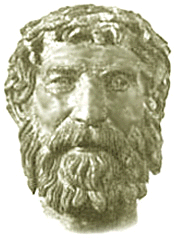
Empedocles - Ἐμπεδοκλῆς ( c. 490 – c. 430 BC)
Empedocles was one the most important ancient Greek philosophers. He was born in ancient Agrigentum in Sicily. He was a Presocratic philosopher and Pluralist . His philosophy is well-known thanks to his learnings about cosmogenic theory where he described the four clasical elements. Also he believed in forces he called Love and Strife . Also, he believed in reincarnation.
Epicharmus of Kos - Ἐπίχαρμος ὁ Κῷος (c. 540 and c. 450 BC)
There`s no evidence about his birthplace but he is a well-known philosopher and dramatist. He wrote about between thirty-five and fifty-two comedies. One of the most important works of him is Alkyon.

Epictetus - Ἐπίκτητος ( c. AD 50 – 135)
His native place was ancient Hierapolis. He was well known as a part of the Stoic School of philosophy as well as an author of the book of Stoic ethical advice entitled as The Enchidiron .
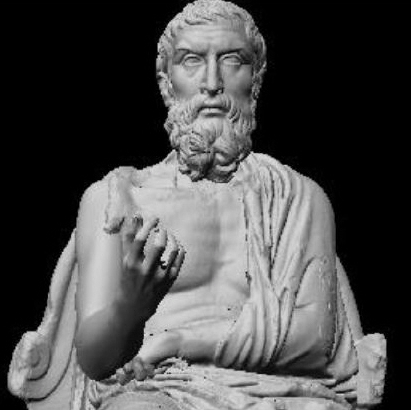
Epicurus - Ἐπίκουρος (341–270 BC)
He is one of the most important philosophers of the ancient times. He was the head and founder of philosophy of Epicureanism. The most important part of his philosophy is the concept of happiness or ataraxia as well as freedom from fear or aponia. He lived in Athens. He also wrote about ethics, politics, epistemology .
Eubulides - Εὑβουλίδης ( fl. 4th century BCE)
He was born in ancient Miletus . He was a part of the Megarian School. His teacher was Euclid of Megara . He is well-known thanks to his so-called seven paradoxes.
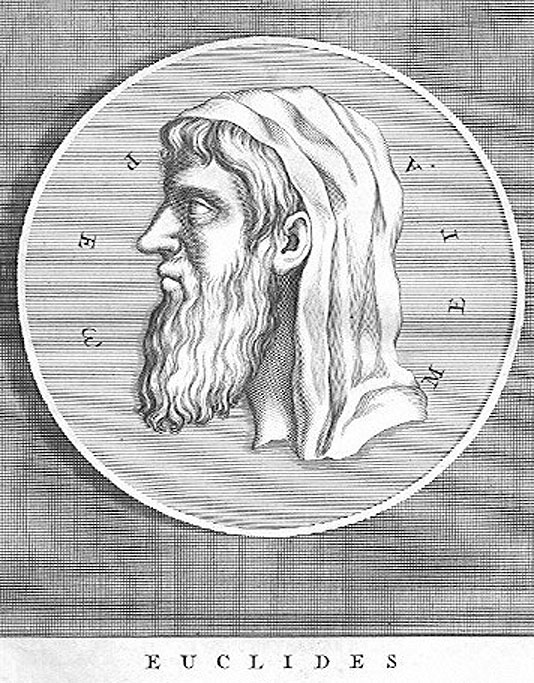
Euclid of Megara - Εὐκλείδης ὁ Μεγαρεύς (c. 435 – c. 365 BCE)
His native place was ancient Megara but his life he spent in Athens . He was the head and founder of the Megarian School of philosophy. His teacher was famous Socrates. His the most important works are the Lamprias , the Aeschines , the Phoenix , the Crito , the Alcibiades , and the Amatory dialogue.
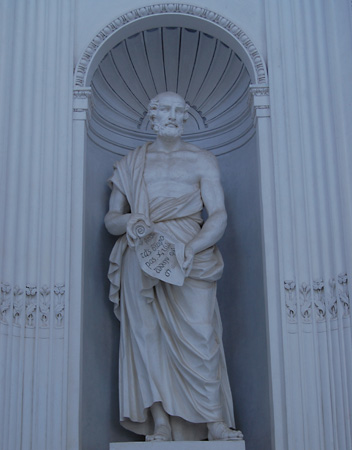
Eudemus of Rhodes - Εὔδημος (c. 370 BC - c. 300 BC)
His native place was ancient Rhodes . His life he spent in Athens. He was a part of the Peripatetic School of Aristotle. His teacher was Aristotle . He is well-known as the first historian of science .
Eudorus of Alexandria - Εὔδωρος (1st century BC)
He was well-known as a Peripatetic philosopher . He is a founder of a teological principle of Platonism . His philosophy is mixure of Platonist, Pythagorean and Stoic ideas .
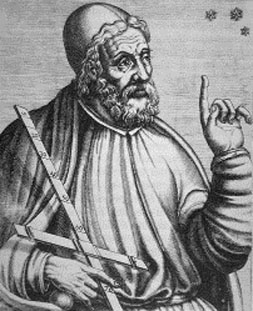
Eudoxus of Cnidus - Εὔδοξος ὁ Κνίδιος (410/408 BC – 355/347 BC)
He was born in ancient Knidos. He was well-known as an Academic Platonist , astronomer and mathematician. His teacher was famous Plato .
Euenus - Εὔηνος (5th-century BC)
He was born in ancient Paros . He was Sophist philosopher and poet.
Euphantus - Εὔφαντος (fl. c. 320 BCE)
He was born in Olynthus . He was a part of the Megarian School of philosophy. His the most important work is " On Kingship ( Περὶ Βασιλείας)". This work is dedicated to Macedonian king Antigonus II Gonatas. Euphantus was his adviser.
Euphraeus - Εὐφραῖος (fl. c. 4th century BCE; d. ca. 342 BCE/341 BCE)
His native place was ancient Oreus . His teacher was Plato . He was an adviser of Perdiccas III of Macedon.
Euphrates - Εὐφράτης (c. 35–118 AD)
He was born in ancient Tyre. He was a part of the Stoic School of philosophy.
Eurytus - Εὔρυτος (fl. 400 BC)
He was born in ancient Croton . He was a part of the Pythagorean School of philosophy. His teacher was famous Diogenes Laertius .
Eusebius of Myndus - Εὐσέβιος (fl. 4th century)
His native place was ancient Myndus . He was a part of the Neoplatonic School of philosophy. His teacher was Aedeisus of Pergamum .
Eustathius of Cappadocia - Εὐστάθιος (c. 400)
He was born in ancient Cappadocia . He was Neoplatonic and Sophist . His teacher was Adesius .
Evander - Εὔανδρος (fl. c. 215 - c. 205)
His native place was ancient Phocis . He was an Academic skeptic . His teacher was Lacydes.
Favorinus (c. 80 – c. 160 AD)
He was born in ancient Arles . He was a sophist.
Gaius the Platonist (2nd century)
He was a Middlie Platonist. His pupil was Albinus .
Geminus - Γεμῖνος ὁ Ῥόδιος (1st century BC)
He was born in ancient Rhodes . He was a Greek astronomer and mathematician. His the most important work is " The Introduction to the Phenomena".
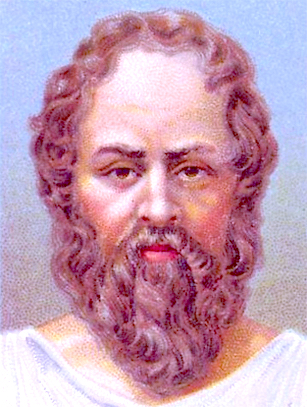
Gorgias - Γοργίας (c. 485 – c. 380 BC)
He was born in ancient Leontini. He was a famous Sophist and rhetorician . He was well-known thanks to his nihilism, rhetorical inovations and his works in that field.
Hagnon of Tarsus (2nd century BC)
He was born in ancinet Tarsus. He was a rhetorician and philosopher. His teacher was Carneades.
Hecataeus of Abdera - Ἑκαταῖος ὁ Ἀβδηρίτης ( the 4th century BC)
He was born in ancient Abdera . He was a Skeptic philosopher and at the same time historian .
Hecato of Rhodes - Ἑκάτων (fl. c. 100 BC)
He was born in ancient Rhodes . His teacher was Panaetius . One of the most important works of him is "Περὶ ἀρετῶν – On Virtues".
Hegesias of Cyrene - Ἡγησίας (fl. 290 BC)
His native place was ancient Cyrene . He was a part of the Cyreanic School of philosophy. His the most important work is " Death by Starvation".
Hegesinus of Pergamon - Ἡγησίνους (--)
There`s no evidence about his life but the fact is that his native place was ancient Pergamon . Also he was the head of the Academy.
Hegias - Ἡγίας (the 5th and 6th centuries)
He was a descendant of famous Plutarch of Athens who was the founder of the Neoplatonist Academy . His teacher was Proclus .
Heliodorus of Alexandria - Ἡλιόδωρος (fl. 5th century)
His native place was ancient Alexandria . He was a part of the Neoplatonic School of philosophy. He lived in Athens and was a pupil of Proclus.
Heraclides Lembus - Ἡρακλείδης Λέμβος (--)
He was well-known as a philospher, historian and statesman. He wrote a lot of works of which the most famous is " Histories (Ἱστορίαι)" in 37 books.
Heraclides Ponticus - Ἡρακλείδης ὁ Ποντικός (387 BC - 312 BC)
He was an Academic Platonist and his teacher was Plato . He spent his life in mostly in Athens . At the same time he was an astronomer.
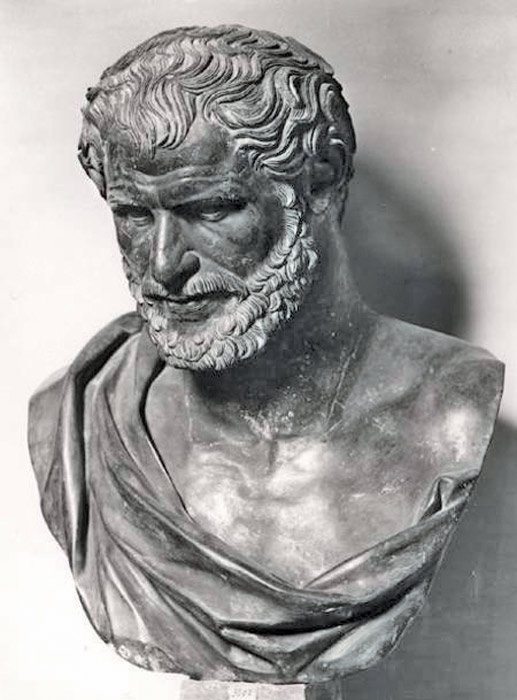
Heraclitus - Ἡράκλειτος ὁ Ἐφέσιος (c. 535 – c. 475 BC)
He was one of the most famous ancient Greek philosophers. He was born in ancient Ephesus. There`s no evidence about his education but the fact is that he was a pre-Socratic philosopher . He was well-known thanks to his phrase πάντα ῥεῖ ( panta rhei ) "everything flows". His the most important work is "On nature".
Heraclius - Ἡράκλειος (4th century)
The most important fact about this philosopher is that he was a part of the Cynic School of philosophy.
Herillus of Carthage - Ἥριλλος (fl. 3rd century BC)
His native place was ancient Carthage . He was a part of the Stoic School of philosophy. His teacher was Zeno of Citium. He wrote many works and one of them is "Περὶ ἀσϰήσεως ( On Training)".
Hermagoras of Amphipolis - Ἑρμαγόρας ὁ Ἀμφιπολίτης (3rd century BC)
His native place was ancient Amphipolis. He was a pupil of Peraseus. He was a part of the Stoic School of philosophy. He wrote many important works.

Hermarchus - Ἕρμαρχoς (c. 325-c. 250 BC)
He was a pupil of famous Epicurus and a follower of his philosophy. His philosophy was criticism of famous philosophers such as Plato, Aristotle and Empedocles . One of his the most important works is "Πρὸς Ἐμπεδoκλέα - Against Empedocles (in 22 books)".
Hermias - Ἑρμείας ἐκ Φοινίκης (born c. 410 - died c. 450)
His native place was ancient Alexandria, but he spent his life in Athens. He was a Neoplatonist . His wife was a famous woman philosopher Aedesia .
Herminus - Ἑρμῖνος (2nd century)
He was a part of the Peripatetic School of philosophy. His pupil was Alexander of Aphrodisias . His philosophy was criticism of Aristotle .
Hermippus of Smyrna - Ἕρμιππος ὁ Σμυρναίος (--)
His native place was ancient Smyrna . He was a part of the Peripatetic School of philosophy. His teacher was Callimachus .
Hermotimus of Clazomenae - Ἑρμότιμος (c. 6th century BCE)
He was born in ancient Clazomenae . He was a part of the Pythagorean School of philosophy.
Hicetas - Ἱκέτας (c. 400 – c. 335 BC)
He was a part of the Pythagorean School of philosophy. His native place was ancient Syracuse . His pupil was Ecphantus.
Hierius - Ἱέριος (fl c. 500)
He was a part of the Neoplatonic School of philosophy. His father was Plutarch of Athens .
Hierocles of Alexandria - Ἱεροκλῆς ὁ Ἀλεξανδρεύς (fl. c. 430)
He was born in ancient Alexandria . He was a Neoplatonist . He was a pupil of famous Plutarch . He wrote many important works.
Hierocles (Stoic) - Ἱεροκλῆς (fl. 2nd century)
He was a part of the Stoic School of philosophy. His the most important work is " Elements of Ethics (Ἠθικὴ στοιχείωσις)".
Hieronymus of Rhodes - Ἱερώνυμος ὁ Ῥόδιος (c. 290 – c. 230 BC)
His native place was ancient Rhodes . He was a part of the Peripatetic School of philosophy. He wrote many important works.
Himerius - Ἱμέριος (c. 315 – c. 386)
He was born in ancient Prusias ad Hypium. His life he spent in Athens. He was a part of the Sophist School of philosophy. He wrote many importnat works during his life.
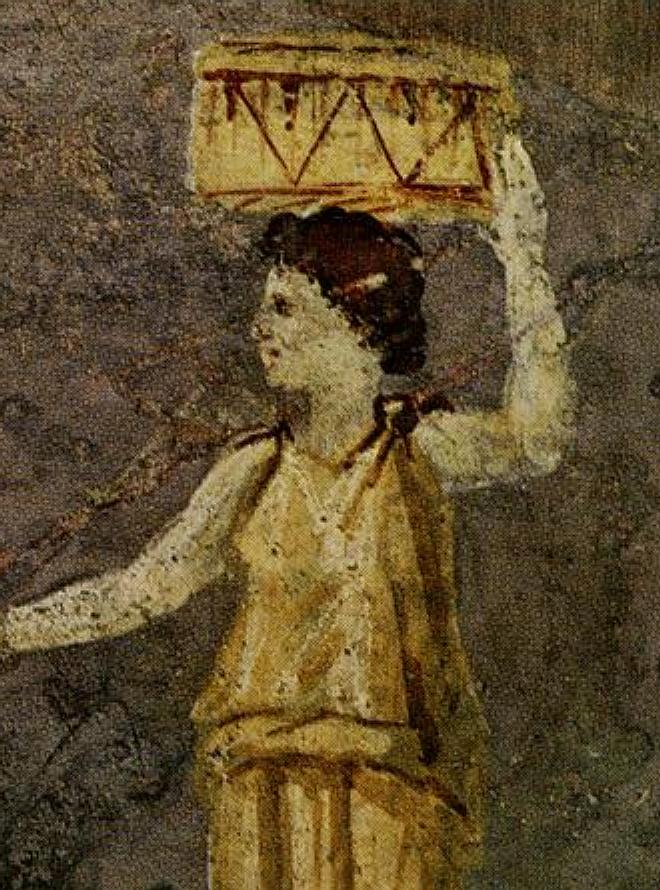
Hipparchia of Maroneia - Ἱππαρχία ἡ Μαρωνεῖτις (fl. c. 325 BC)
She was woman philosopher born in ancient Maroneia . She was a part of the Cynic School of philosophy. His husband was famous Crates of Thebes.
Hippasus - Ἵππασος ὁ Μεταποντῖνος (fl. 5th century BC)
There`s no evidence about his life but the fact is that he was a part of the Pythagorean School of philosophy. Also he is well-known thanks to his doctrine of irrational numbers.
Hippias - Ἱππίας ὁ Ἠλεῖος (5th century BC)
He was born in ancient Elis. He was a part of the Sophist School of philosophy. He wrote many important works dedicated to rhetorical, philosophical , and political studies . He lived in time of Socrates .
Hippo - Ἵππων (fl. 5th century BC)
He was a part of the pre-Socratic School of philosophy. He was a natural philosopher.
Horus (fl. 4th century)
He was born in ancient Egypt. He was well-known as an ancient athlete and philosopher. He was a part of the Cynic School of philosophy.
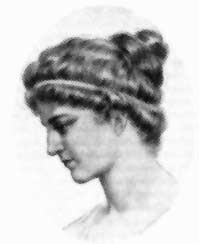
Hypatia of Alexandria - Ὑπατία (born 350-370 – 415)
She was a woman philosopher, mathematician and astronomer. She was born in ancient Egypt where she spent her time. She was the head the Neoplatonic school at Alexandria.
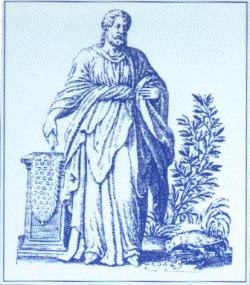
Iamblichus - Ἰάμβλιχος (c. 245-c. 325)
His native place was ancient Syria . He was well-known thanks to his neoplatonic philosophy and cosmology.
Ichthyas - Ἰχθύας (fl. 4th-century BCE)
His teacher was Euclid of Megara. Also he was a part of the Megarian School of philosophy.
Idomeneus of Lampsacus - Ἰδομενεύς Λαμψακηνός (c. 325 – c. 270 BC)
There`s no evidence about his life but the fact is that he was a pupil of famous Epicurus. His wife was also philosopher Batis of Lampsacus .
Ion of Chios - Ἴων ὁ Χῖος ( c. 490/480 – c. 420 BC)
His native place was Chios, but his life he spent in Athens. He was a Pythagorean philosopher, poet, writer and dramatist. One of his the most important works are the Triagmos.
Isidore of Alexandria - Ἰσίδωρος (450 – c. 520)
He was born in ancient Alexandria in Egypt . He was a part of the Neoplatonic School of philosophy. His life he spent in Athens .
Jason of Nysa - Ἰάσων (1st-century BC)
He was born in ancient Nysa . His grandfather was Posidonius . His grandfather was and his teacher at the Stoic school of Rhodes. One of his the most important works is "Βίος Ἑλλάδος - Life of Greece".
Lacydes of Cyrene - Λακύδης ὁ Κυρηναῖος (before 241 - c. 205 BC)
His native place was Cyrene. He was an Academic skeptic and the head of the Academy of Athens .
Leonteus of Lampsacus ( the 3rd century BCE)
He was born in ancient Lampsacus. He and his wife Themista were pupils of Epicurus .
Leontion - Λεόντιον ( fl. 300 BCE)
She was a woman philosopher, a member of the Epicurean School of philosophy. Interesting fact is that she was a hetaera or prostitute of the ancient time.
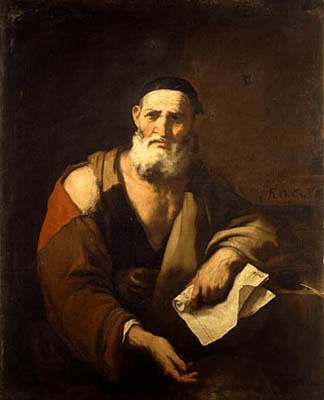
Leucippus - Λεύκιππος (fl. 5th cent. BCE)
There`s no evidence about his true birth place. He was an Atomist and Presocratic philosopher.
Lyco of Iasos - Λύκων (4th century BCE)
His native place was ancient Iasos . He was a part of the Pythagorean School of philosophy. His the most important work is " On the Pythagorean Life".
Lyco of Troas - Λύκων ( c. 299 – c. 225 BC)
He was born in ancient Troas. He was a part of the Peripatetic School of philosophy. His teacher was Strato . He wrote many important works and one of the most important is " On Characters".
Lycophron - Λυκόφρων (--)
He was well-known thanks to Aristotle who mentioned him in "The Politics" . He was a Sophist.
Lysis of Taras - Λῦσις (fl. c. 5th-century BC)
There`s no evidence about his life. The fact is that his teacher was Pythagoras. His pupil was Epaminondas .
Marinus of Neapolis - Μαρίνος ὁ Νεαπολίτης (born c. 440 AD)
His native place was Flavia Neapolis. His life he spent in Athens where he was a pupil of Proclus.
Maximus of Ephesus - Μάξιμος ὁ Ἐφέσιος (c. 310 – 372 AD)
He was born in ancient Ephesus . He was a Neoplatonic philosopher . His the most important works were: On Insoluble Contradictions , On Forecasts , On Numbers.
Maximus of Tyre - Μάξιμος Τύριος (fl. late 2nd century AD)
His native place was ancient Tyre . He was a Middle Platonist and rhetorician . He wrote about ethical and theological issues.
Meleager of Gadara - Μελέαγρος ὁ Γαδαρεύς (1st century BCE)
His native place was ancient Gadara . He was a part of the Cynic School of philosophy and a poet.
Melissus of Samos - Μέλισσος ὁ Σάμιος (fl. 5th century BC)
He was born in Samos . He was a pre-Socratic and Eleatic philosopher.
Menedemus - Μενέδημος ὁ Ἐρετριεύς (345/4 – 261/0 BC)
He was born in Eretria and he was the head and founder of the Eretrian School of philosophy. One of his teacher was Stilpo.
Menedemus of Pyrrha - Μενέδημος ( fl. c. 350 BC)
His native place was Pyrrha . He was an Academic Platonist .
Menedemus the Cynic - Μενέδημος (fl. 3rd century BC)
He was a part of the Cynic School of philosophy. His teacher was Colotes of Lampsacus .
Menippus - Μένιππος ὁ Γαδαρεύς (fl. 3rd century BC)
His native place was Gadara . He was a Cynic philosopher. He wrote many works and one of the most important is "Νέκυια – Necromancy".
Metrocles - Μητροκλῆς (fl. c. 325 BC)
He was a part of the Aristotle`s Lyceum but he was a Cynic philosopher. He wrote many important works.
Metrodorus of Athens - Μητρόδωρος ὁ Ἀθηναῖος (the 2nd century BC)
He was born in Athens. He was well-known philosopher and painter of his time.
Metrodorus of Chios - Μητρόδωρος ὁ Χῖος (fl. 4th century BC)
He was born in Chios . He was a part of the Democritus` school . His teacher was Nessus of Chios.
Metrodorus of Cos - Μητρόδωρος τῆς Κῶ (fl. c. 460 BC)
His native place was ancient Cos . His father was also philosopher Epicharmus . He was a Pythagorean philosopher .
Metrodorus of Lampsacus (the elder) - Μητρόδωρος Λαμψακηνός (died in 464 BC)
His native place was ancient Lampsacus . Famous Anaxagoras was his close friend.
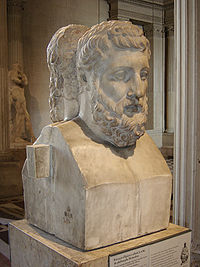
Metrodorus of Lampsacus (the younger) - Μητρόδωρος Λαμψακηνός (331/0–278/7 BC)
He was a part of the Epicurean School of philosophy. He wrote many important works and one of the most important is "Πρὸς τοὺς ἰατρούς, τρία – Against the Physicians (3 volumes)".
Metrodorus of Stratonicea - Μητρόδωρος τῆς Στρατονικείας (fl. 2nd century BC)
His native place was Stratonicea . He was a part of the Epicurean School of philosophy.
Mnesarchus of Athens - Μνήσαρχος (c. 160-c. 85 BC)
He was born in Athens . His teacher was Diogenes of Babylon . He was a S toic philosopher .
Moderatus of Gades (1st century AD)
He was born in ancient Gades. He was a Neopythagorean . He wrote very important works about the doctrines of Pythagorean philosophy.
Monimus - Μόνιμος (4th century BCE)
His native place was Syracuse . He was a Cynic philosopher .
Myia - Μυῖα (fl. c. 500 BC)
She was a woman philosopher and she was a daughter of famous Pythagoras . Also, she was wife of Milo of Croton .
Nausiphanes - Ναυσιφάνης (c. 325 BC)
He was born in ancient Teos. He was an Atomist philosopher influenced by Democritus. He had many great pupils and a lot of philosophical works.
Nicarete of Megara - Νικαρέτη (--)
She was a woman philosopher born in Megara. Her life is very controversial. The fact is that she was the hetaera of wealthy people in ancient Greece. She was a part of the Megarian shool of philosophy. She was a mistress and a pupil of Stilpo.
Nicolaus of Damascus - Νικόλαος Δαμασκηνός (born around 64 BC)
He was born in ancient Damascus . He was a teacher and friend of many famous people of his time as well as he was a teacher of the children of Mark Antony and Cleopatra.
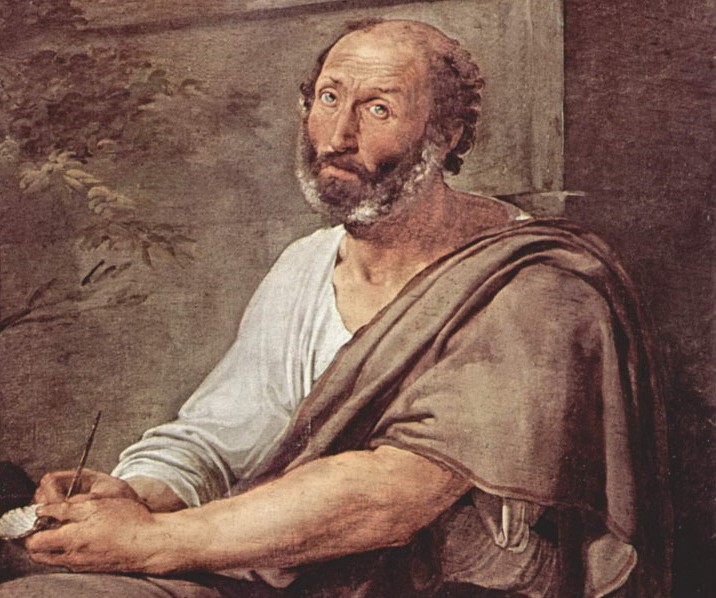
Nicomachus - Νικόμαχος (c. 60 – c. 120 CE)
His native place was ancient Gerasa . He was a Neopythagorean philosopher and mathematician . He wrote many important works inspired by Aristotle . One of his most important works is " Art of Arithmetic - Τέχνη ἀριθμητική".
Nicomachus (son of Aristotle) - Νικόμαχος (fl. c. 325 BC)
There`s no evidence about his life but the fact is that his father was famous Aristotle . He was born in Stageira like his father. There were rumors that he was a lover of Aristippus.
Numenius of Apamea - Νουμήνιος ὁ ἐξ Ἀπαμείας (fl. c. 275)
He lived in ancient Apamea . He was a Neopythagorean philosopher . He wrote many important works.
Nymphidianus of Smyrna - Νυμφιδιανός (fl. c. 360)
He was born in ancient Smyrna but he lived in Athens. He was a part of the Neoplatonic school of philosophy, but he was also influenced by sophists.
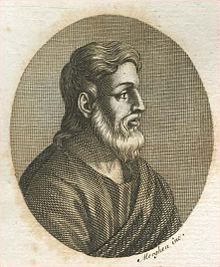
Ocellus Lucanus (the 2nd century BC)
His native place was ancient Lucania . He was a part of the Pythagorean School of philosophy.
Oenomaus of Gadara - Οἱνόμαος ὁ Γαδαρεύς (fl. 2nd century CE)
He was born in ancient Gadara . He was a Cynic philosopher and pagan . His the most important works are: On Cynicism, Republic, On philosophy according to Homer, On Crates and Diogenes and other subjects .
Olympiodorus the Elder - Ὀλυμπιόδωρος (5th-century)
He was a Neoplatonist born in Alexandria . His pupil was Proclus .
Olympiodorus the Younger - Ὀλυμπιόδωρος ὁ Νεώτερος (c. 495 – 570)
He was born in Alexandria . He was a part of the Neoplatonist tradition. His teacher was Ammonius Hermiae .
Onasander - Ὀνήσανδρος ( fl. 1st century AD)
There`s no evidence about his life but the fact is that he was an author of the losted text about Plato`s "Republic" .
Onatas - Ὀνάτας (fl. c. 5th century BC)
It`s not clear whether he was born in ancient Croton or Tarentum. He was a Pythagorean philosopher.
Origen the Pagan - Ὠριγένης (fl. early 3rd century)
He spent his time in ancient Alexandria . He was influenced by Platonic philosophy . His teacher was Ammonius Saccas .
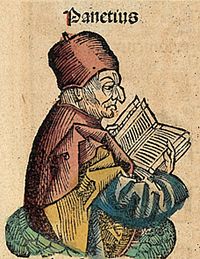
Panaetius - Παναίτιος ( c. 185 - c. 110/109 BC)
His native place was Rhodes . His life he spent in Rome and Athens. One of his famous teachers was Antipater of Tarsus. His the most important work is " On Duties".
Pancrates of Athens - Παγκρατης (fl. c. 140 AD)
He was born in Athens . He was a follower of Cynicism .
Panthoides (fl. c. 275 BCE)
He was a philosopher and dialectician. He was a part of the Megarian School . His the most important work is " On Ambiguities".
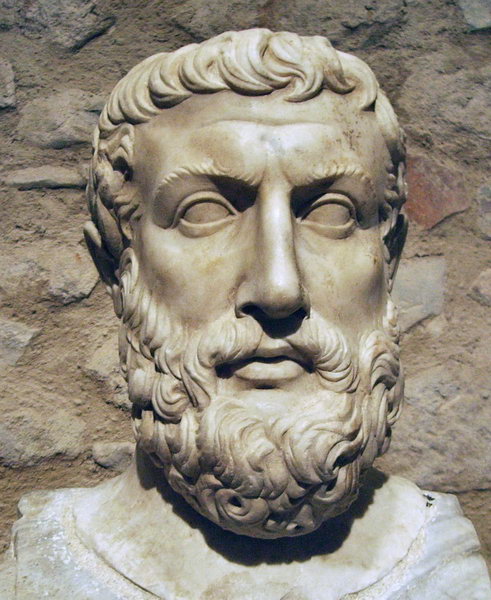
Parmenides of Elea - Παρμενίδης ὁ Ἐλεάτης (fl. late 6th or early 5th century BC)
He was born in ancient Elea in Magna Graecia. He is one of the most important ancient Greek philosophers. He was the head of the Eleastic School of philosophy. His the most important work is poem "On Nature" .
Pasicles of Thebes - Πασικλές (4th century BC)
His native place was ancient Thebes . He was brother of Crates. He was a part of the Magarian School of philosophy. His teacher was Euclid of Megara.
Patro the Epicurean - Πάτρων (--)
His life he spent in Rome and Athens . He was a part of the Epicurean School of philosophy.
Peregrinus Proteus - Περεγρῖνος Πρωτεύς (c. 95 – 165 AD)
He was born in ancient Parium . He was a part of the Cynic School of philosophy.
Persaeus - Περσαῖος (307/6–243 BC)
He was born in Citium. He was a part of the Stoic School of philosophy. His father was Demetrius and his teacher was Zeno of Citium .
Phaedo of Elis - Φαίδων ὁ Ἠλεῖος (fl. 4th century BC)
He was born in ancient Elis . At the first time he was a slave but thanks to Socrates and Aristotle he became a philosopher. He was a founder and the head of the Elean School of philosophy but he was also a part of the Eretrian School. Platonic dialogue "Phaedo" is dedicated to him because he saw the death of Socrates .
Phaedrus - Φαῖδρος (138 – 70/69 BC)
He was well-known and as Phaedrus the Epicurean . He was a student and than the head of the Epicurean School of Athens. He lived in time of Cicero .
Phanias of Eresus - Φαινίας ὁ Ἐρέσιος (--)
His native place was ancient Lesbos . His life he spent in Athens and his teacher was Aristotle . He was a part of the Peripatetic School of philosophy. His philosophy is well-known thanks to his logic, natural history and literature .
Phanto of Phlius - Φάντων (4th century BC)
He was born in ancient Philus . He was a part of the Neopythagorean School of philosophy. His teachers were Philolaus and Eurytus .
Philip of Opus - Φίλιππος Ὀπούντιος (fl. 4th century BC)
He was born in Opus . He was a member of Plato`s Academy . He was an astronomer. His teacher was Plato .
Philiscus of Aegina - Φιλίσκος Αἰγινήτης (4th century BC)
He was born in Aegina . Everyone in his family were philosophers. He was a Cynic . He was a teacher of famous Alexander The Great.
Philiscus of Thessaly (2nd-3rd century)
He was from Thessaly. He was a Sophist . He was friend and colleague of Julia Domna, a wife of Roman Emperor Septimius Severus .
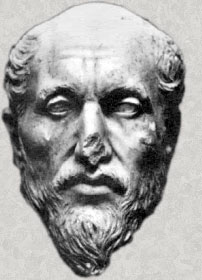
Philo - Φίλων (c. 25 BCE – c. 50 CE)
He was born in ancient Alexandria in Egypt . His philosophy was a mixture of Greek and Jewish philosophy. Especially in his ethics he was inspired by Aristotle.
Philo of Larissa - Φίλων (154/3–84/3 BC)
His native place was Larissa . He was an Academic skeptic. His teacher was Clitomachus. Part of his life he was spent in Rome.
Philo the Dialectician (fl. 300 BC)
He was also known as Philo of Megara . He was a part of the Megarian School of philosophy. He was a pupil of Diodorus Chronus .
Philodemus - Φιλόδημος ὁ Γαδαρεύς (c. 110 – prob. c. 40 or 35 BC)
He was born in Gadara. He was a poet, philosopher, rhetorician, musician and theologist. He was a part of the Epicurean School of philosophy. He was a pupil of Zeno of Sidon .

Philolaus - Φιλόλαος (c. 470 – c. 385 BCE)
He was born in Croton . He was a follower of Pythagorean philosophy . He wrote many philosophical and cosmological works.
Philonides of Laodicea (c. 200 – c. 130 BCE)
His native place was Laodicea . He was an Epicurean philosopher and at the same time a mathematician .
Philostratus - Φλάβιος Φιλόστρατος (c. 170/172 – 247/250)
He was also known as Philostratus the Athenian. He was a part of the Sophist School of philosophy. He wrote many important works of which the most important is " Lives of the Sophists - Βίοι Σοφιστῶν".
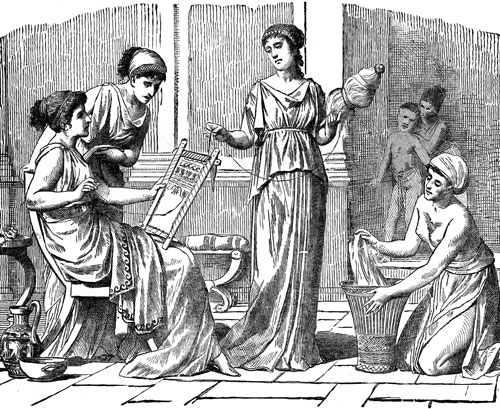
Phintys - Φίντυς (4th or 3rd century BC)
She was a woman philosopher. There`s no evidence about her life but the fact is that she was a part of the Pythagorean School of philosophy. She wrote about a traditional role for women.
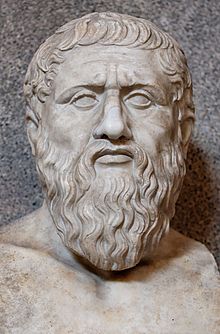

Plotinus - Πλωτῖνος ( c. 204/5 – 270)
He was born in ancient Egypt in the city of Lycopolis . Intellectuals considered that he was a leading philosopher of the ancient Greek world because his philosophy is based on three principles: t he One, the Soul, the Intellect. He was a pupil of Ammonius Saccas. He was a part of the Neoplatonic School of philosophy.
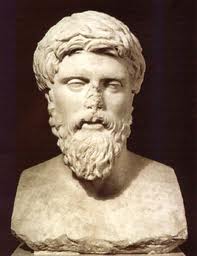
Plutarch - Πλούταρχος (AD 46 – AD 120)
He was a Middle Platonist . He was born in ancient Chaeronea. He was one of the most important ancient Greek philosophers.
Plutarch of Athens - Πλούταρχος ὁ Ἀθηναῖος ( c. 350 – 430 AD)
He was a Neoplatonist born in ancient Athens . His parents were also philosophers. His the most important pupils were Syrianus and Proclus.
Polemarchus - Πολέμαρχος (5th century – 404 BCE)
He was born in ancient Piraeus . His parents were also philosophers.
Polemon of Athens - Πολέμων ὁ Ἀθηναῖος (fl. 2nd century BCE)
He was a part of the Stoic School of philosophy . He was born in Athens . He was also and geographer. His father was a philosopher. He wrote many important works and one of the most important is " On the inscriptions to be found in cities - Περὶ τω̂ν κατὰ πόλεις ἐπιγραμμάτων".
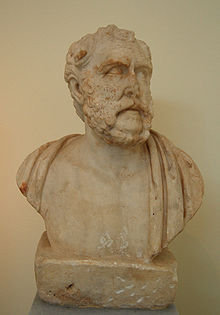
Polemon of Laodicea - Μάρκος Ἀντώνιος Πολέμων (c. 90 – 144)
He was also known as Polemon of Smyrna. He was born in Laodicea. He was an eminent sophist .
Polemon - Πολέμων (d. 270/269 BC)
He was born in Athens. He was the head of the Plato`s Academy . His teacher was Xenocrates. His father was also a philosopher.
Polus - Πῶλος (fl. c. 5th century BCE)
His native place was Athens . His teacher was Gorgias .
Polyaenus of Lampsacus - Πoλύαινoς Λαμψακηνός (c. 340 – c. 285 BCE)
He was born in Lampsacus . He was an Epicurean philosopher and mathematician . His father was a philosopher. The fact is that Epicurus was his close friend.
Polystratus (died 219/18 BCE)
He was the head of the Epicurean School of Athens .
Porphyry - Πορφύριος (c. 234 – c. 305 AD)
He was born in Tyre . He was a Neoplatonic philosopher . He wrote many important works dedicated to Philosophy from Oracles and Against the Christians.
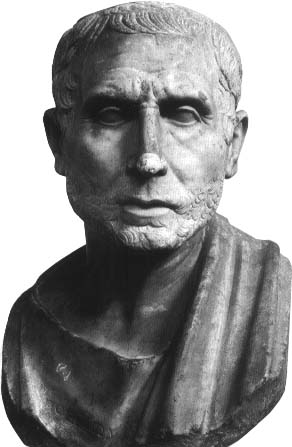
Posidonius - Ποσειδώνιος (c. 135 BCE – c. 51 BCE)
He is also well-known as Posidonius of Apameia or Posidonius of Rhodes . He was a politician, Stoic philosopher, historian, teacher and astronomer .
Potamo of Alexandria - Ποτάμων ὁ Ἀλεξανδρεύς (--)
He was an Eclectic philosopher .
Praxiphanes - Πραξιφάνης (--)
He was born in ancient Mytilene, but his life he spent in Rhodes . He was a part of the Peripatetic School of philosophy.
Priscian of Lydia - Πρισκιανός Λυδός (fl. c. 550)
His native place was Lydia . He was a part of the Neoplatonic School of philosophy. His the most important works are An epitome of Theophrastus' On Sense-Perception and Answers to Chosroes ( Solutiones ad Chosroen ).
Priscus of Epirus (c. 305 – c. 395 AD)
He was from ancient Epirus but his life he spent in Athens. He was a part of the Neoplatonic School of philosophy.
Proclus - Πρόκλος ὁ Διάδοχος (412 – 485)
He was born in Constantinople . He was a Neoplatonist . He wrote many important works and one of them is Elements of Theology (Στοιχείωσις θεολογική).
Proclus Mallotes - Πρόκλος Μαλλώτης (--)
He was born in Mallus . He was a Stoic philosopher .
Prodicus - Πρόδικος ὁ Κεῖος (c. 465 BC – c. 395 BC)
He was a Sophist born in Ioulida. His philosophy is also well-known thanks to his linguistics, ethics and naturalism.
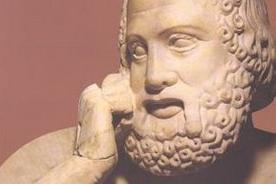
Protagoras - Πρωταγόρας (c. 490 – c. 420 BC)
He was a pre-Socratic philosopher from Abdera . His philosophy is well-known thanks to his relativism and agnosticism .
Ptolemy-el-Garib (--)
He was a Peripatetic philosophe r and an author of the work entitled " A Life of Aristotle".
Pyrrho - Πύρρων (c. 360 BC – c. 270 BC)
He was the first S keptic philosopher born in Elis.
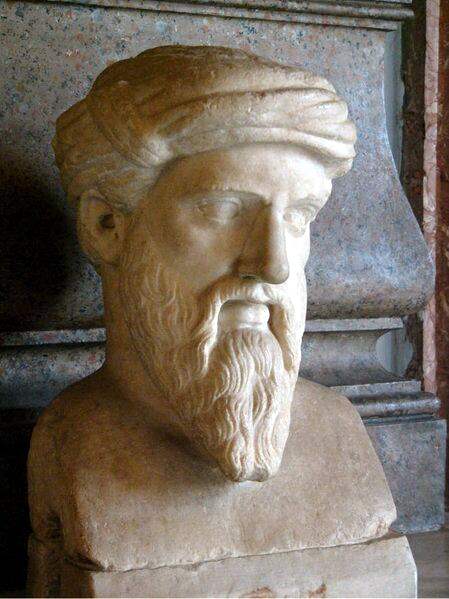
Pythagoras - Πυθαγόρας ὁ Σάμιος ( c. 570 – c. 495 BC)
He was one of the most important ancient Greek philosophers born in Samos. He was an Ionian philosopher, and at the same time a mathematician . He is founder of the movement of Pythagoreanism.
Sallustius - Σαλούστιος (4th-century)
He was a Neoplatonic philosopher and a close friend of the Roman Emperor Julian . He was also and a writer and his the most important work is " On the Gods and the Cosmos".
Sallustius of Emesa (5th century)
He was a Cynic philosopher born in ancient Emesa .
Satyrus - Σάτυρος (--)
He is also well-known as Satyrus the Peripatetic. He was born in Callatis. He was a Peripatetic philosopher and historian.
Secundus the Silent (2nd century AD)
His life he spent in Athens. He was a Cynic and Neopythagorean philosopher.
Sextus of Chaeronea - Σέξστος ὁ Χαιρωνεύς (fl. c. 160 AD)
He was a Stoic philosopher from Chaeronea. His grandfather was Plutarch.
Simmias of Thebes - Σιμμίας (fl. 5th–4th century BCE)
He was a Pythagorean philosopher born in ancient Thebes . His teacher was Socrates . Plato mentioned him in his Phaedo.
Simon the Shoemaker - Σίμων Ἀθηναῖος, σκυτοτόμος (c. late 5th century BC)
He was a Socratic philosopher, also well-known as a philosopher and worker . He has collaborated with Socrates and he wrote many important works.
Simplicius of Cilicia - Σιμπλίκιος (c. 490 – c. 560)
He was a Neoplatonic philosopher born in ancient Cilicia . One of his teachers was Damascius . He wrote many very important works.
Siro (fl. c. 50 BC)
He was also well-known as Siro the Epicurean . His life he spent in Naples .
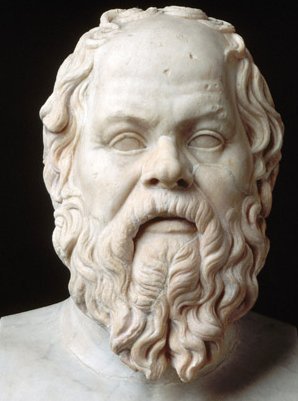
Sopater of Apamea - Σώπατρος ὁ Ἀπαμεύς (died before 337)
He was a Neoplatonic philosopher born in Apamea. His teacher was Iamblichus. One of his works is " On Providence".
Sosigenes - Σωσιγένης (the 2nd century AD)
He is also well-known and as Sosigenes the Peripatetic. He was a pupil of Alexander of Aphrodisias. His the most important work is " On Revolving Spheres".
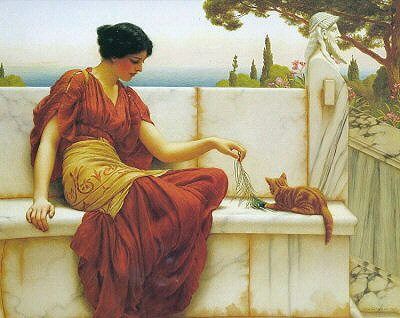
Sosipatra - Σωσιπάτρα (fl. c. 325)
She was a woman mystic and philosopher born in Ephesus . She was a part of the Neoplatonic School of philosophy. She was a wife of Eustathius of Cappadocia .
Sotion (fl. 1st century)
Sotion was born in Alexandria. He was a part of the Neopythagorean School of philosophy, more precisely he was a part of the school of the Sextii .
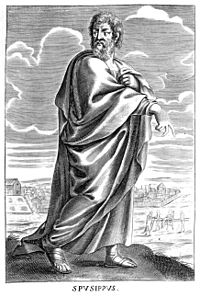
Speusippus - Σπεύσιππος (c. 408 – 339/8 BC)
He was born in Athens as a nephew of famous Plato . He was an Academic philosopher . His philosophy is well-known thanks to his ethics, metaphysics and epistemology .
Sphaerus - Σφαῖρος (c. 285 BC – c. 210 BC)
His native place was ancient Borysthenes. He was a Stoic philosopher and he was a pupil of Zeno of Citium and Cleanthes . He wrote many very important works. One of the most important is "Περὶ κόσμου δύο – On the Universe (two books)".
Stilpo - Στίλπων (c. 360 – c. 280 BC)
He was born in ancient Megara and he was a part of the Megarian School of philosophy. His philosophy is well-known thanks to his logic and ethics.
Strato of Lampsacus - Στράτων ὁ Λαμψακηνός (c. 335 – c. 269 BC)
He was born in ancient Lampsacus . He was a Peripatetic philosopher and the head of the Lyceum.
Syrianus - Συριανός (died c. 437)
He was born in ancient Alexandria. He was a Neoplatonic philosopher and the head of the Plato`s Academy of Athens.
Telauges - Τηλαύγης (c. 500 BC)
There`s no evidence about his life but the fact is that he was a son of Pythagoras .
Telecles of Phocis - Τηλεκλῆς (died 167/166 BC)
He was an Academic skeptic born in ancient Phocis . His teacher was Lacydes .
Teles the Cynic - Τέλης ( fl. c. 235 BC)
He is also well-known as Teles of Megara . He was a part of the Cynic School of philosophy. He wrote many important works and one of them is "Περὶ τοῦ δοϰεῖν ϰαὶ τοῦ εἶναι - On Seeming and Being".
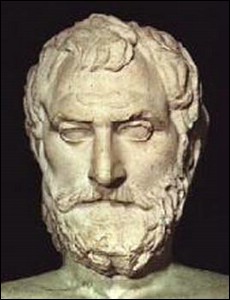
Thales - Θαλῆς ( c. 624 – c. 546 BC)
He is also well-known as Thales of Miletus . His native place was ancient Miletus and he was one of the most important ancient Greek philosophers. He was a pre-Socratic philosopher and the first philosopher of the ancient Greek philosophy. His philosophy is famous thanks to his astronomy, politics, geometry, cosmology and theoremes .
Theagenes of Patras - Θεαγένης (fl. c. 160 AD)
He was born in ancient Patras . He was a part of the Cynic school of philosophy.
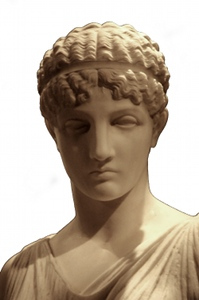
Theano - Θεανώ (fl. 6th-century BC)
She was a woman philosopher born in ancient Crotone but it`s not reliable information. She was a Pythagorean philosopher . There were rumors that she was wife of famous Pythagoras . She wrote a few writings but they are lost.
Themista of Lampsacus (--)
She was a woman Epicurean philosopher born in Lampsacus . Her teacher was Epicurus . Leonteus was her husband.
Themistius - Θεμίστιος (317 – c. 390 AD)
He was a Neoplatonic philosopher born in Paphlagonia . He was also politician and rhetorician . He wrote many important works and one of them are: On the Posterior Analytics, On the Physics and On On the Soul.
Theodorus of Asine - Θεόδωρος Ἀσιναῖος (fl. 3rd–4th century)
He was born in Asine. His teacher was Iamblichus. He was a part of the Neoplatonic philosophy.
Theodorus the Atheist - Θεόδωρος ὁ ἄθεος (c. 340 – c. 250 BCE)
He was born in Cyrene . He was a part of the Cyreanic school of philosophy.
Theon of Smyrna - Θέων ὁ Σμυρναῖος (fl. 100 CE)
He was a Neopythagorean philosopher born in Smyrna . At the same time he was and mathematician and his the most important work is " On Mathematics Useful for the Understanding of Plato".
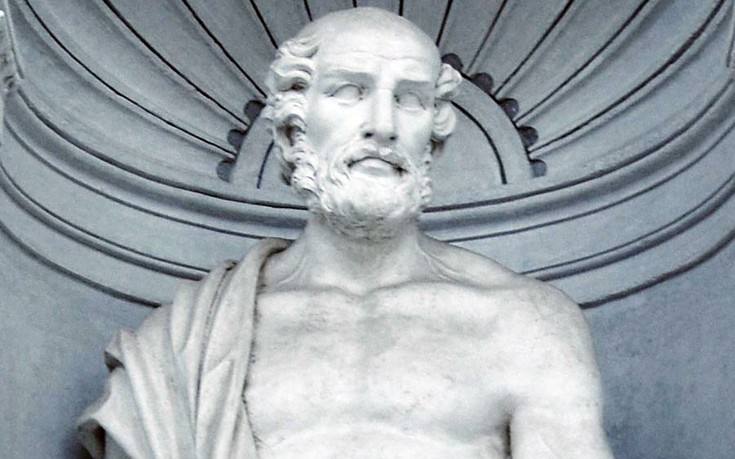
Theophrastus - Θεόφραστος (c. 371 – c. 287 BC)
He was a Peripatetic philosopher born in Eresos . His life he spent in Athens . His philosophy is well-known thanks to his ethics and metaphysics . He wrote many important works.
Thrasymachus - Θρασύμαχος (c. 459 – c. 400 BC)
He was a Sophist from Chalcedon. Plato mentioned him in his work "Republic" .
Thrasymachus of Corinth - Θρασύμαχος ( fl. 4th century BCE)
He was a Megarian philosopher born in Corynth.
Timaeus of Locri - Τίμαιος ὁ Λοκρός (--)
He was a Pythagorean philosophy well-known thanks to Plato who mentioned him in his dialogues Timaeus and Critias.
Timaeus the Sophist (fl. between 1st and 4th centuries)
He was a Middle Platonist and an author of " Lexicon of Platonic words".
Timon - Τίμων ὁ Φλιάσιος (c. 320 BC – c. 230 BC)
He was a Skeptic philosopher and his teacher was Pyrro . His native place was Phlius. He wrote poetry and prose.
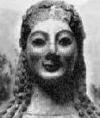
Timycha - Τιμύχα Λακεδαιμονία (early 4th century BCE)
She was a woman philosopher born in Sparta . She was a part of the Pythagorean school of philosophy.
Tisias - Τεισίας (fl. 5th century BC)
He was a Sophist philosopher and rhetoric . Testimonies about his written works are visible in Aristotle`s, Plato `s and Cicero`s works.
Xenarchus of Seleucia - Ξέναρχος (1st century BC)
He was a Peripatetic philosopher born in Cilicia . He was and well-known grammarian .
Xeniades - Ξενιάδης (--)
He was a Phyrronist born in Corinth. There`re two people with this name in the history of philosophy.

Xenocrates - Ξενοκράτης (c. 396/5 – 314/3 BC)
He was well-known an Academic philosopher born in Chalcedon. He was the head of the Plato`s Academy of Athens. At the same time he was and a mathematician. He wrote many important works and his philosophy is well-known thanks to his epistemology, metaphysics and ethics.
Xenophanes of Colophon - Ξενοφάνης ὁ Κολοφώνιος ( c. 570 – c. 475 BC)
He was a Presocratic and Eleastic philosopher born in Colophon. He was and a poet.
Xenophilus - Ξενόφιλος (4th century BC)
He was a Pythagorean philosopher born in Chalcidice . His the most important pupil was Aristoxenus.
Zenobius - Ζηνόβιος (--)
He was a Sophist philosopher who spent his life in Rome.
Zenodotus - Ζηνόδοτος (fl. late 5th century)
He was born in Athens. He was a part of the Neoplatonic school of philosophy.
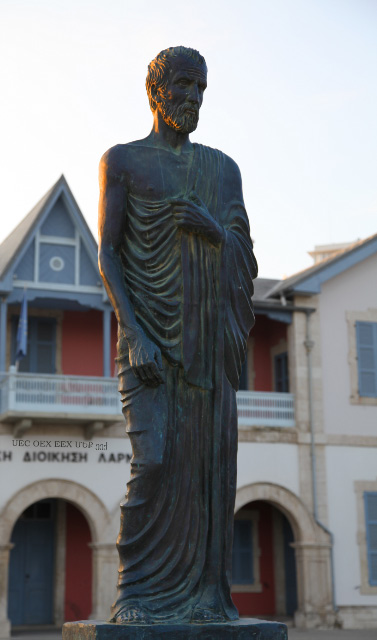
Zeno of Citium - Ζήνων ὁ Κιτιεύς ( c. 334 – c. 262 BC)
He was born in Citium. He was one of the most important ancient Greek philosophers because he was a founder of the Stoic school of philosophy. He wrote many important works and his philosophy is famous thanks to his logic, physics and ethics .
Zeno of Elea - Ζήνων ὁ Ἐλεάτης (c. 490 – c. 430 BC)
He was pre-Socratic philosopher born in Elea . He was a part of the Parmenide`s Eleatic School. His philosophy is well-known thanks to his paradoxes .
Zeno of Sidon - Ζήνων ὁ Σιδώνιος (c. 150 – c. 75 BC)
He was an Epicurean philosopher born in Sidon . He was teacher of Philodemus .
Zeno of Tarsus - Ζήνων ὁ Ταρσεύς ( fl. 200 BC)
He was a Stoic philosopher born in Tarsus. His father was also philosopher. His teacher was Chrysippus .

| Music: Vangelis, Introduction (Alexander The Great) |